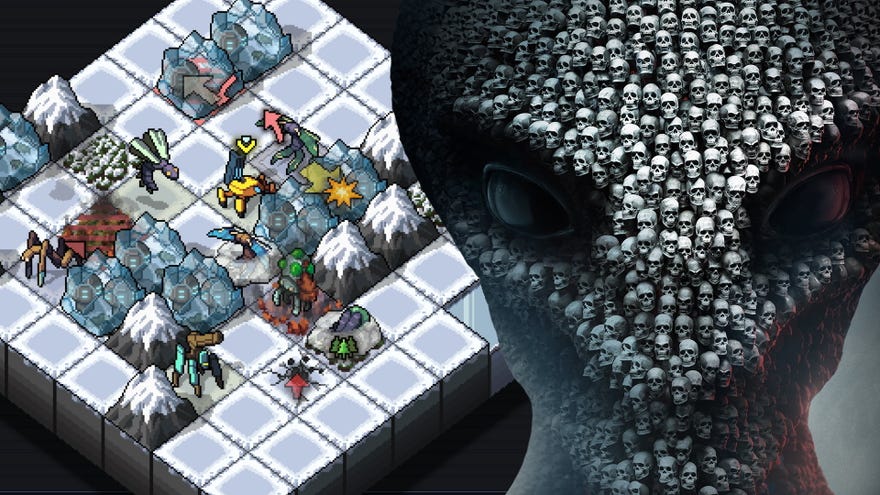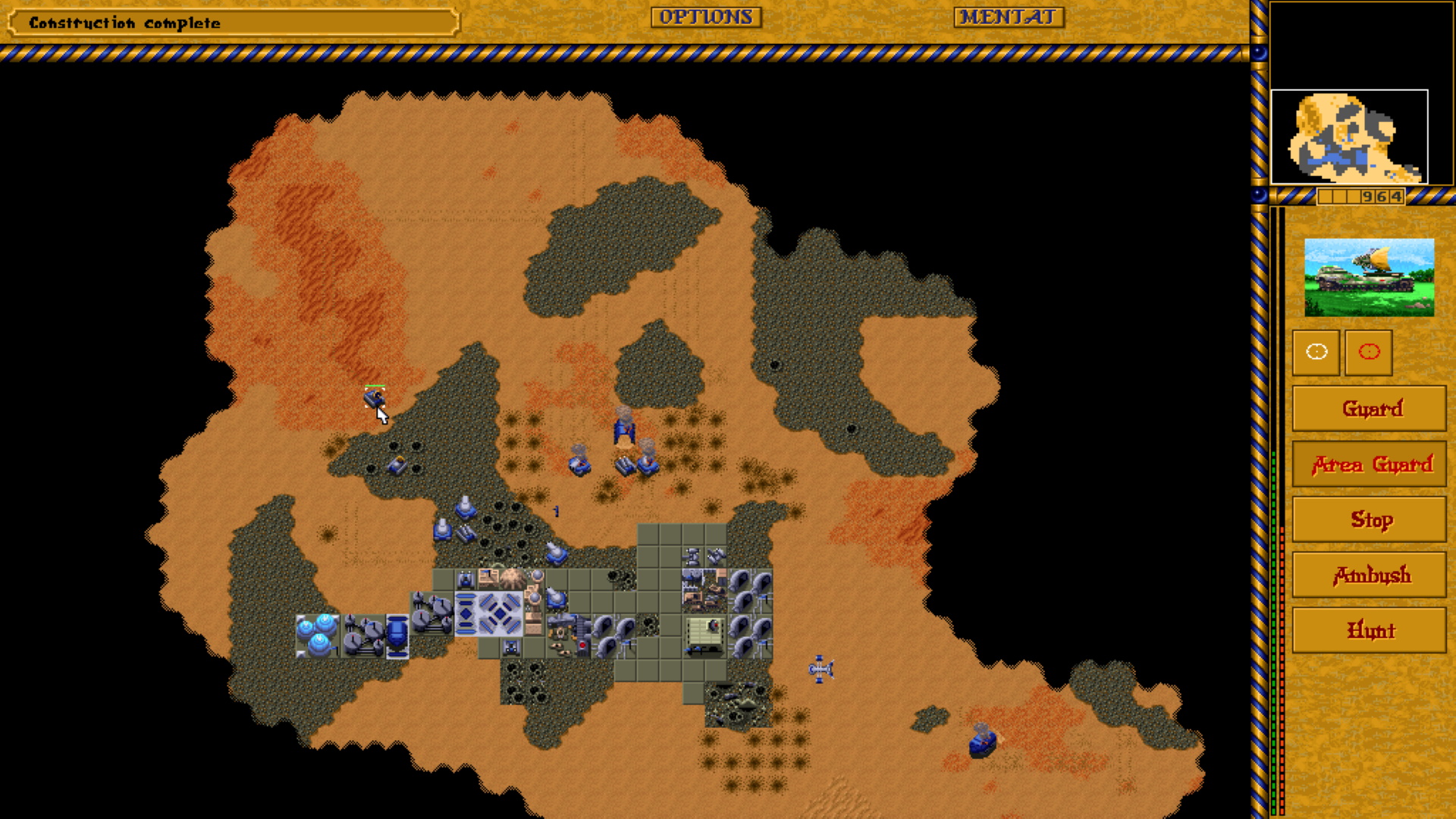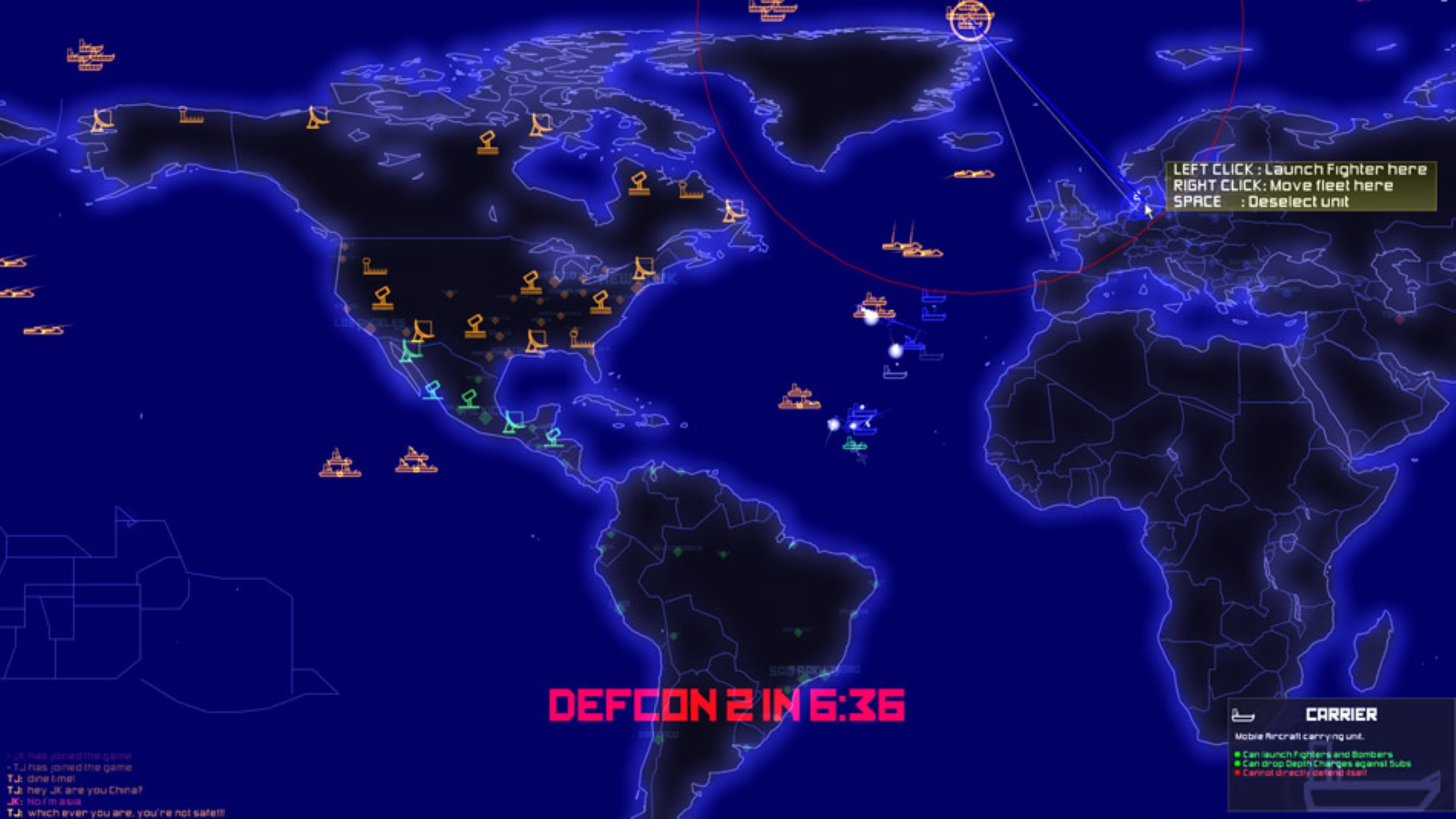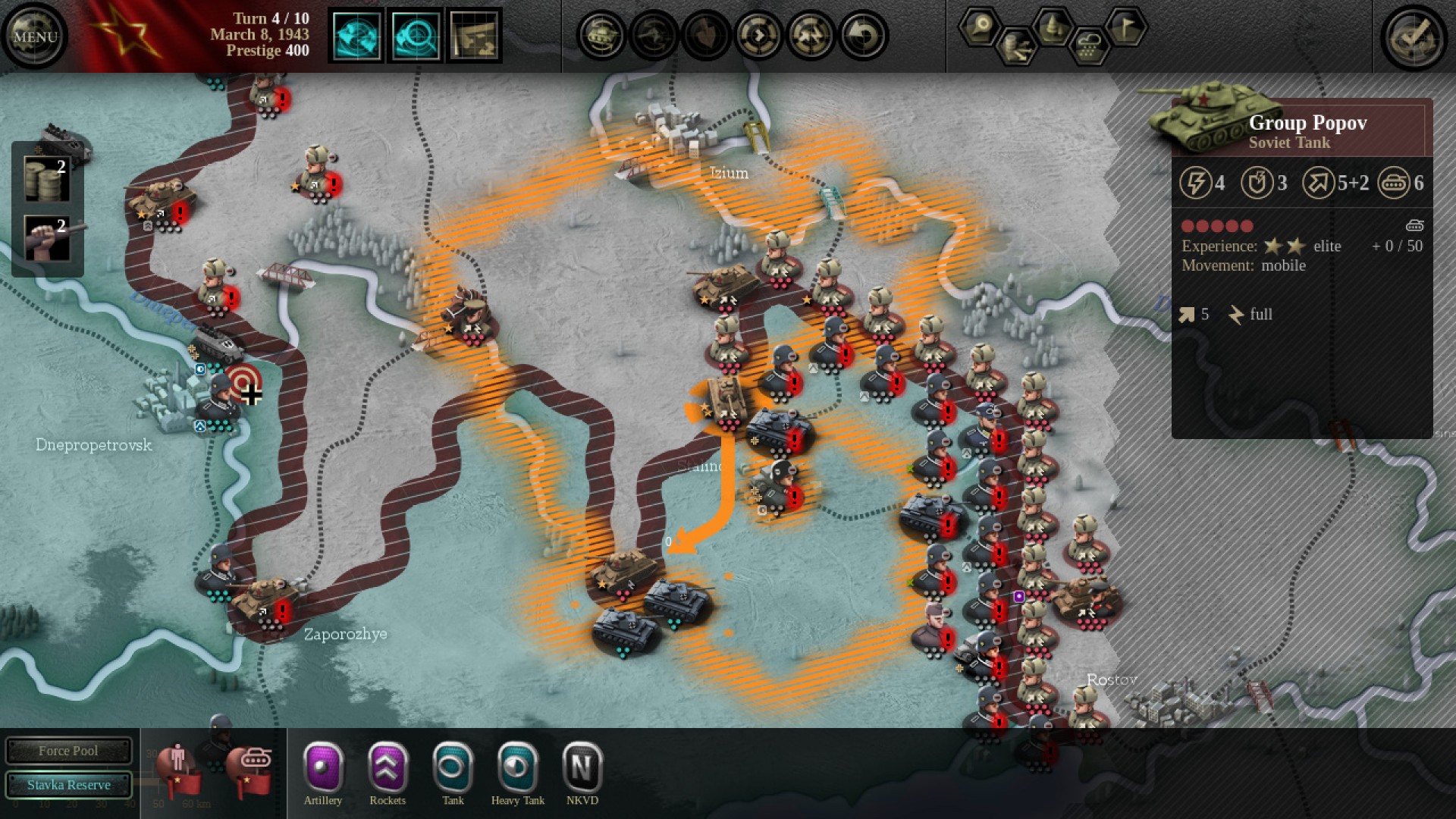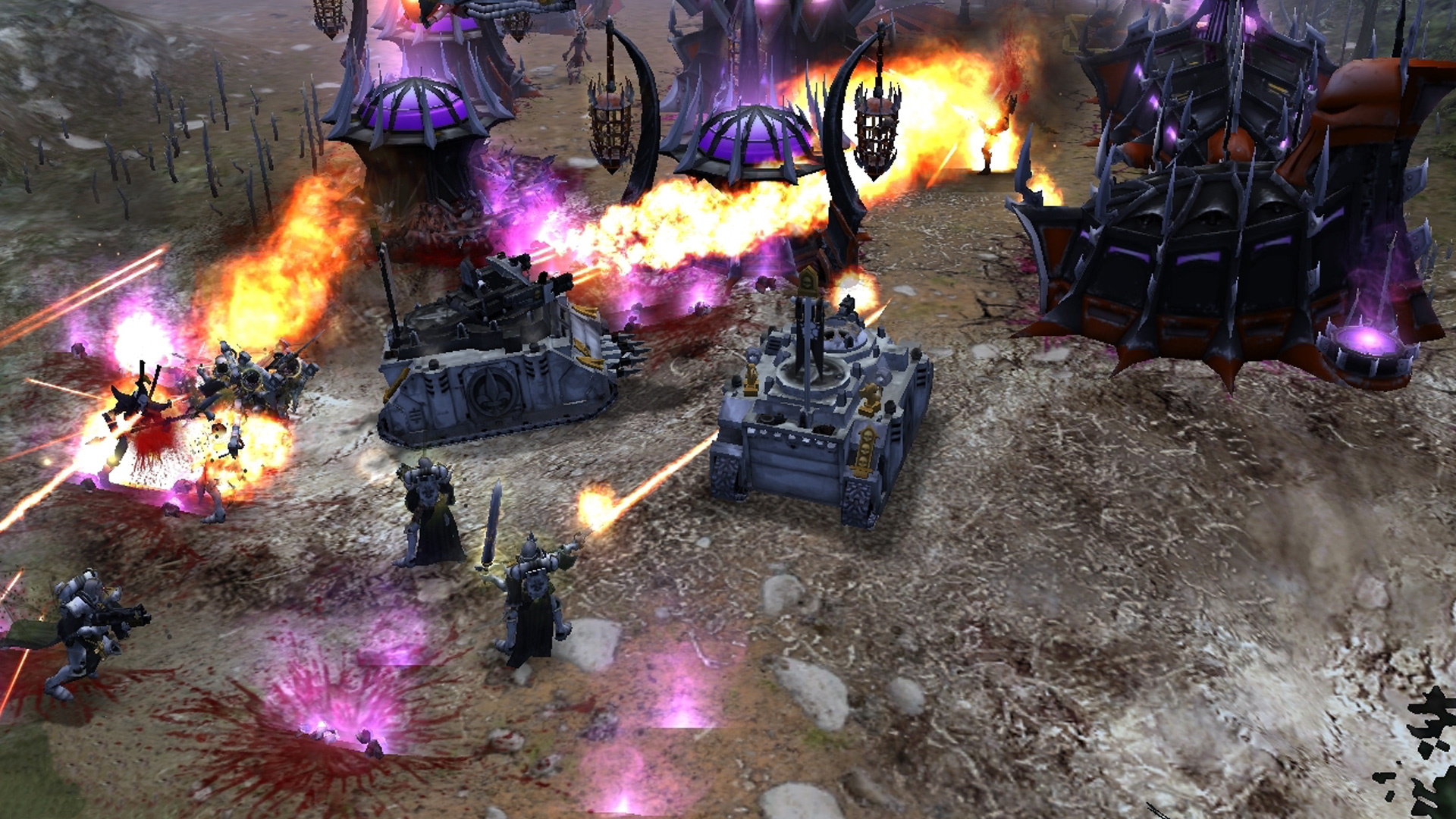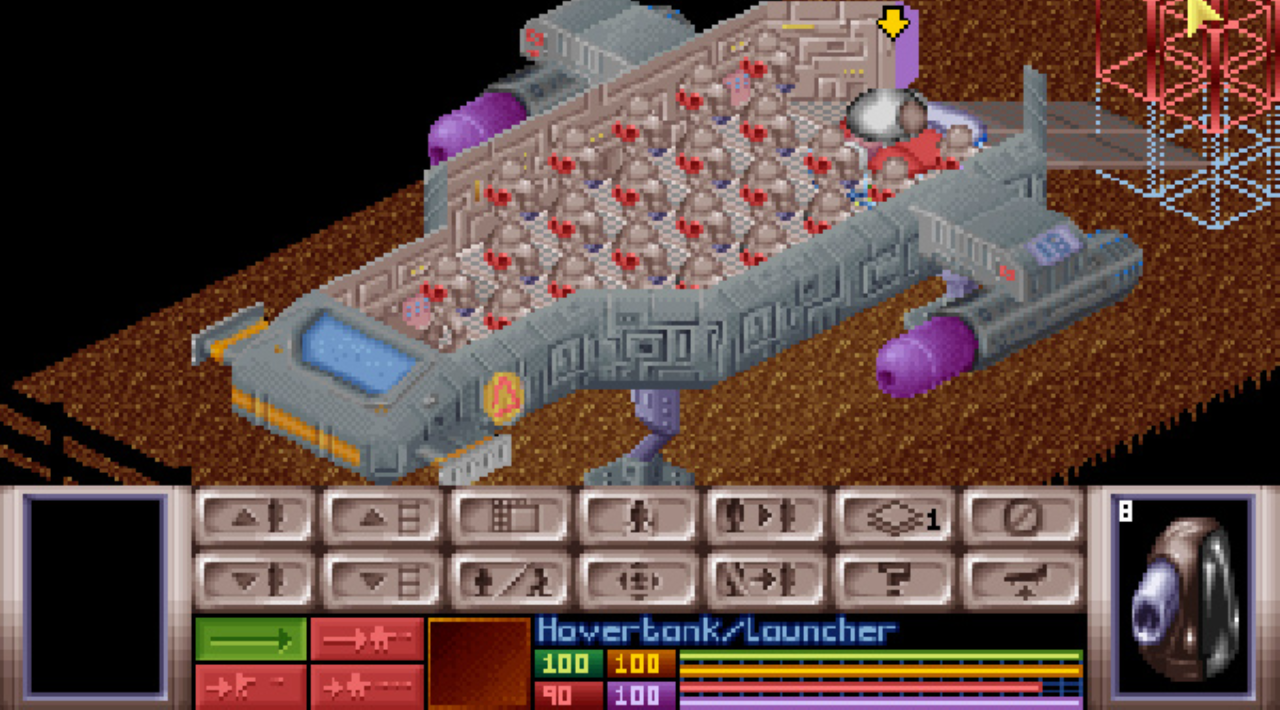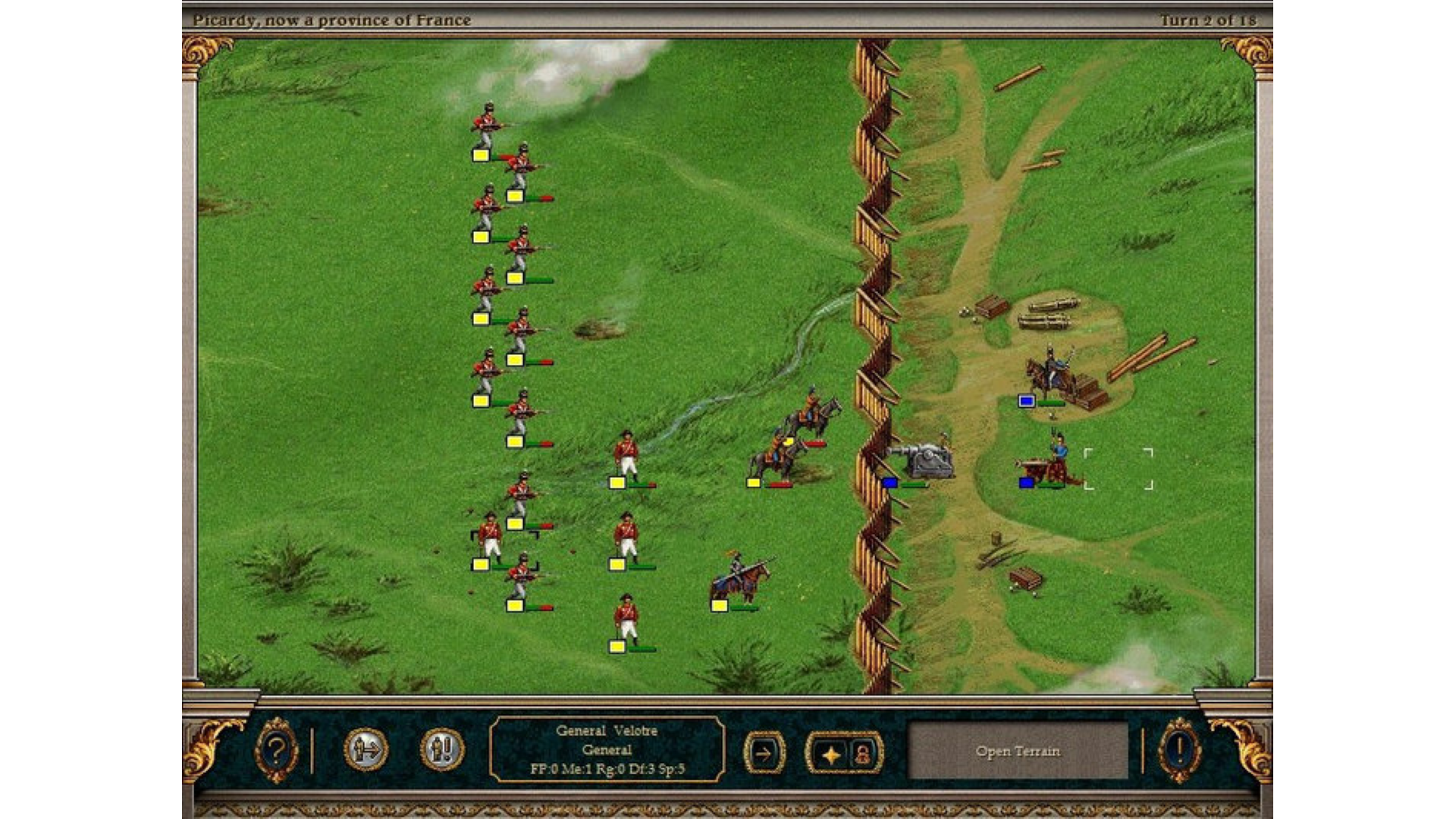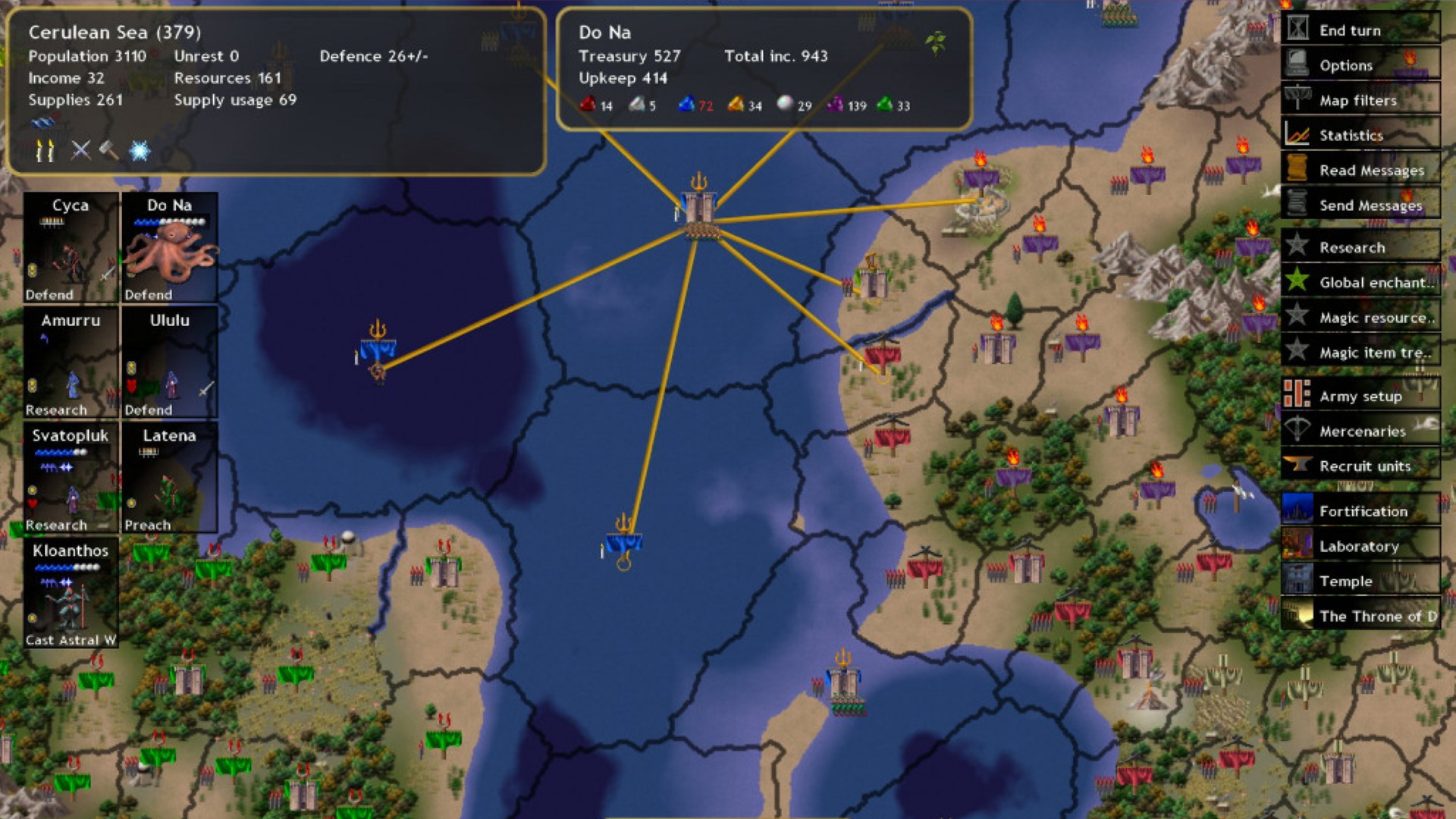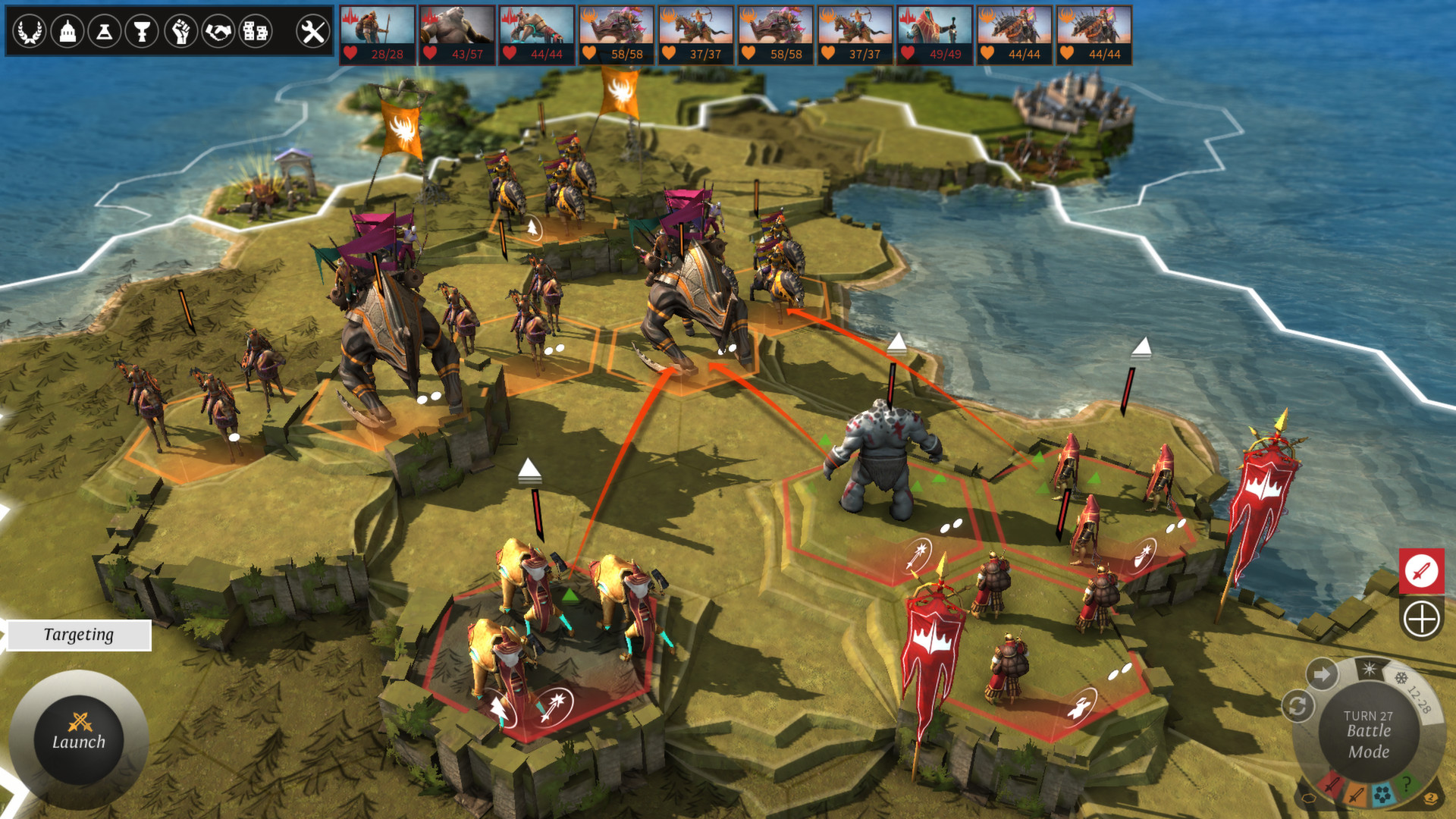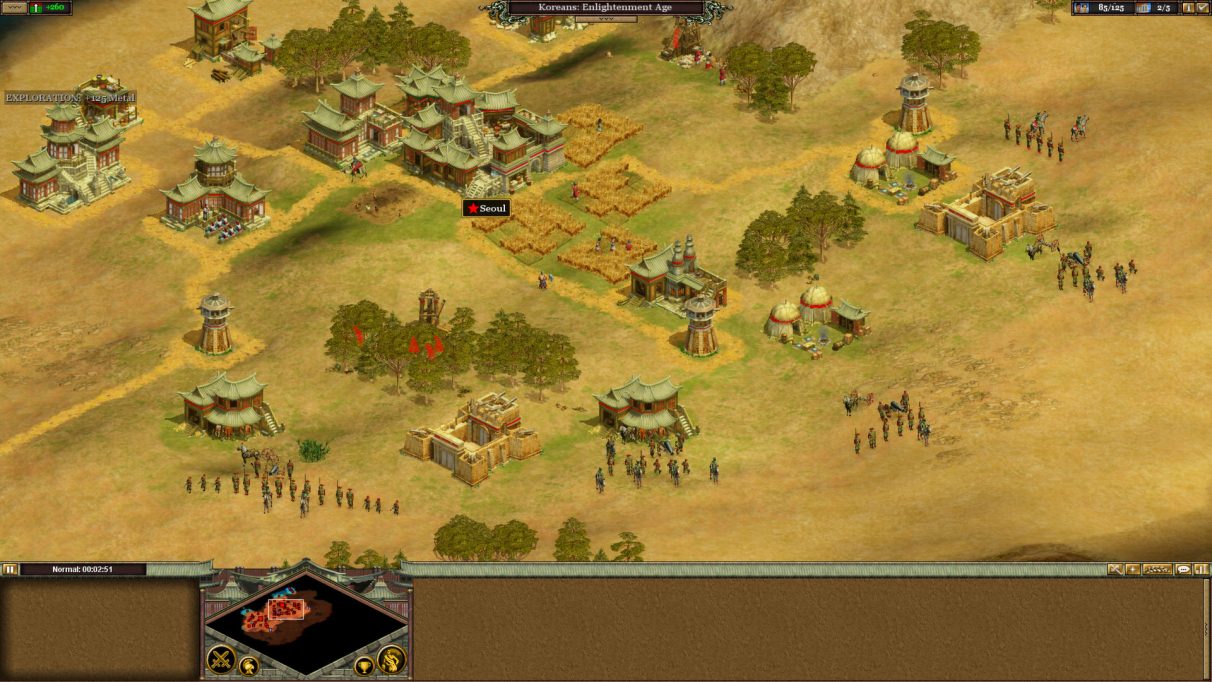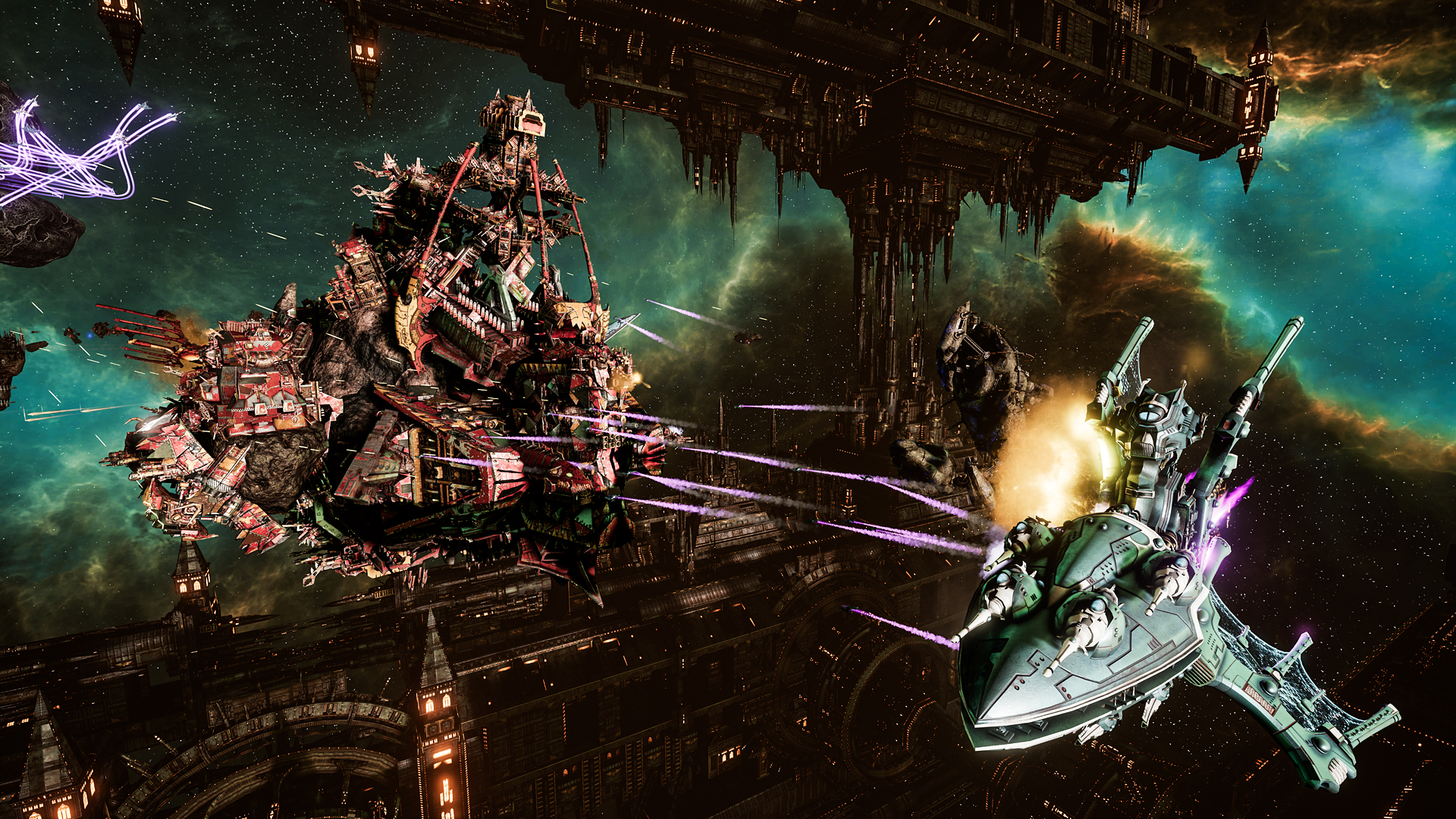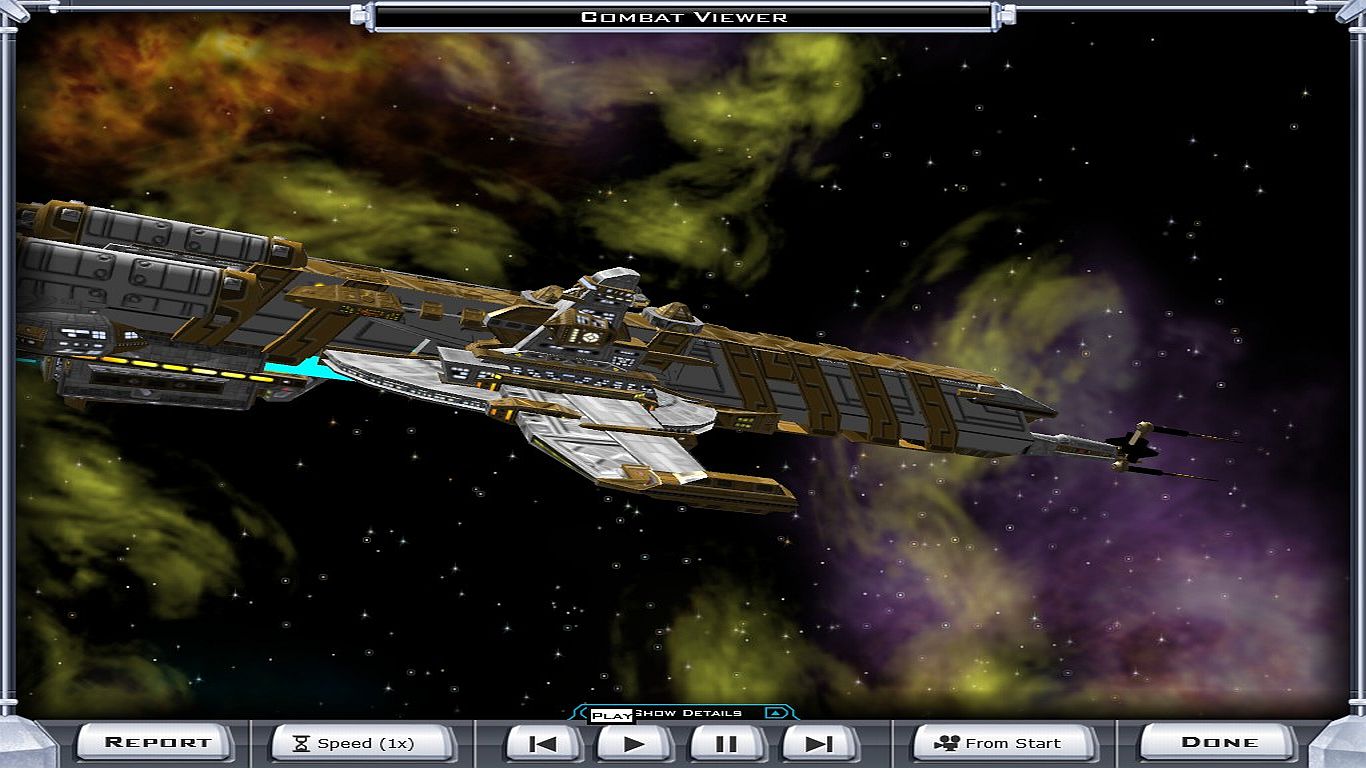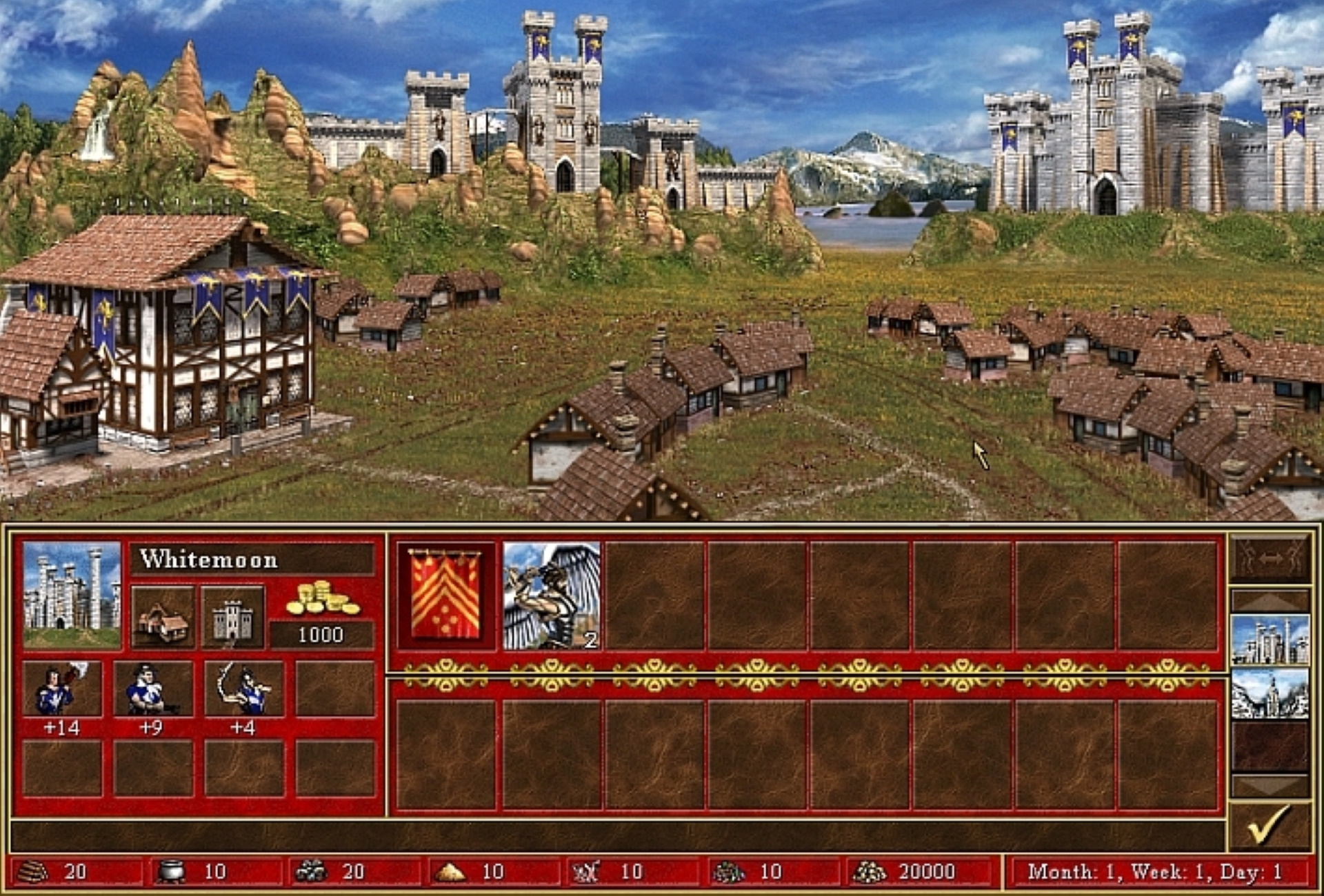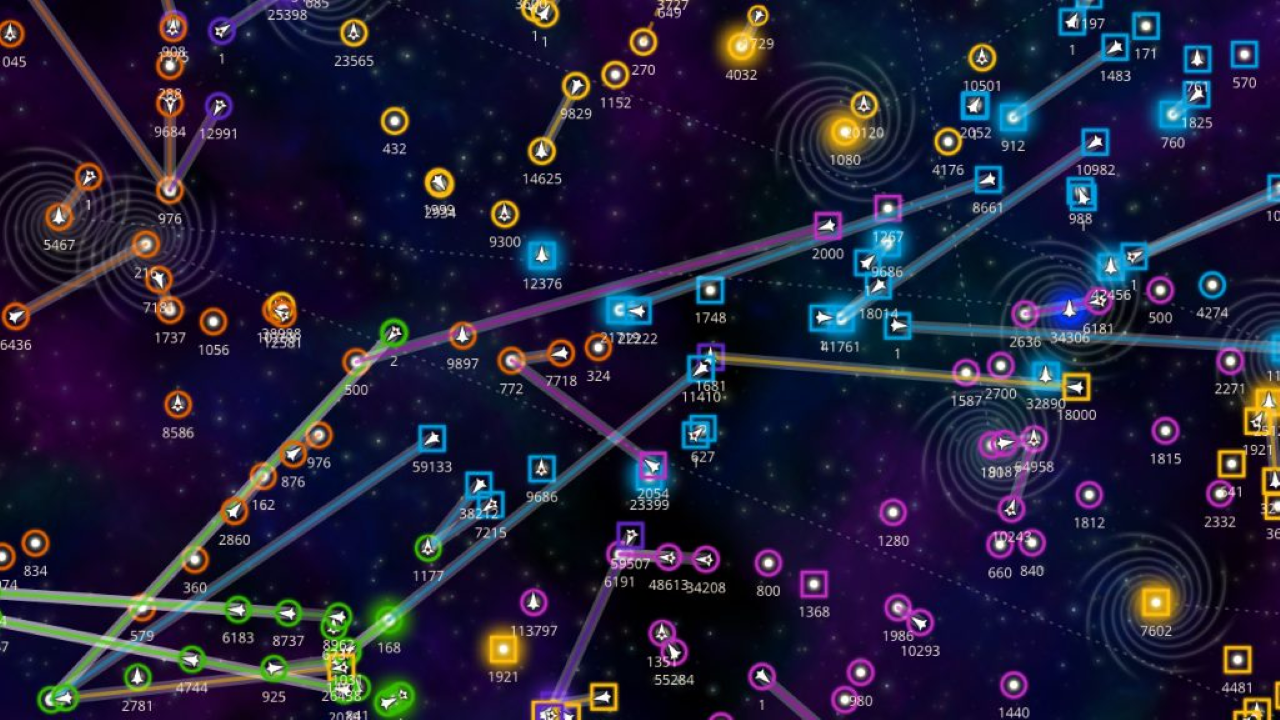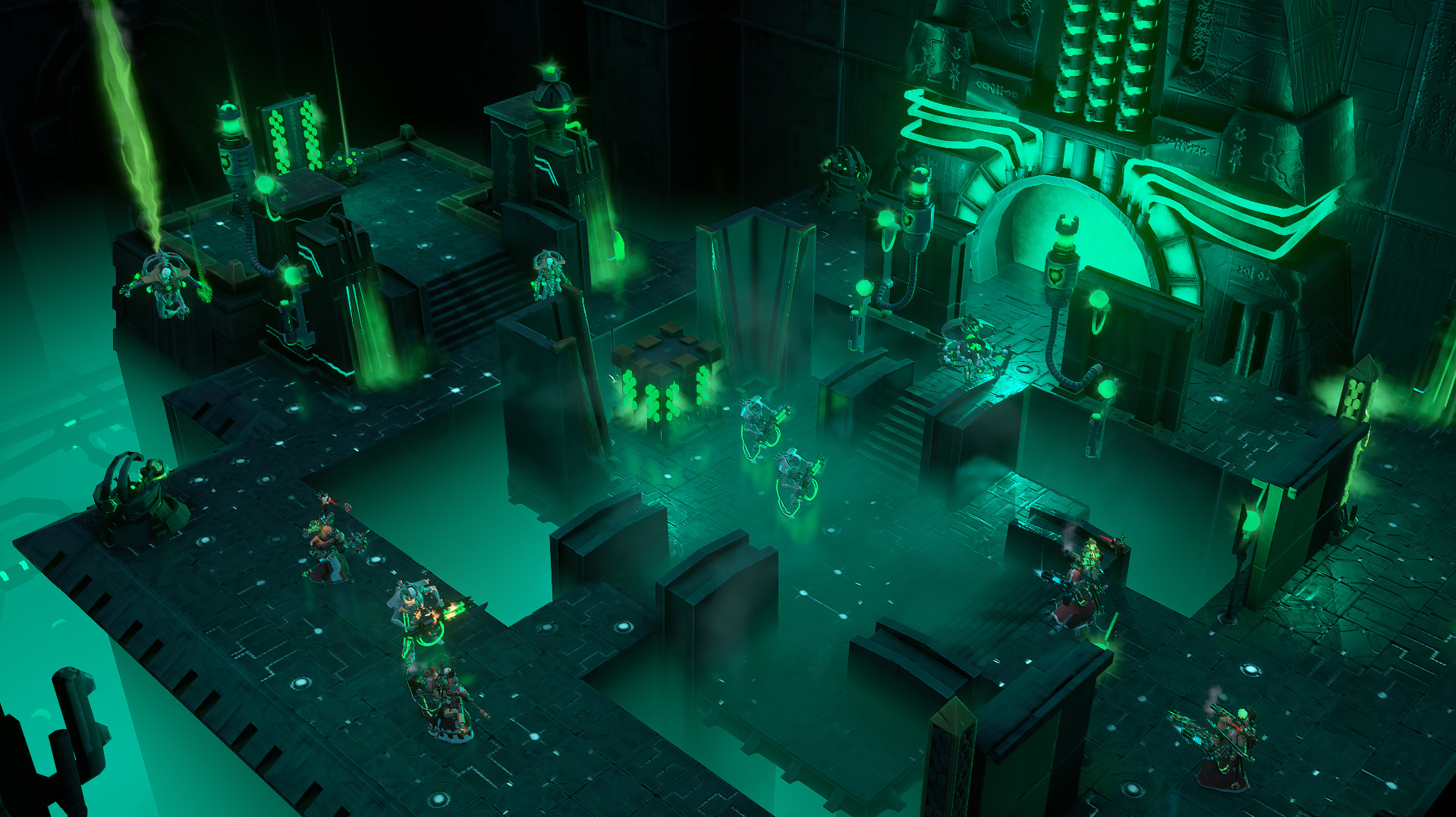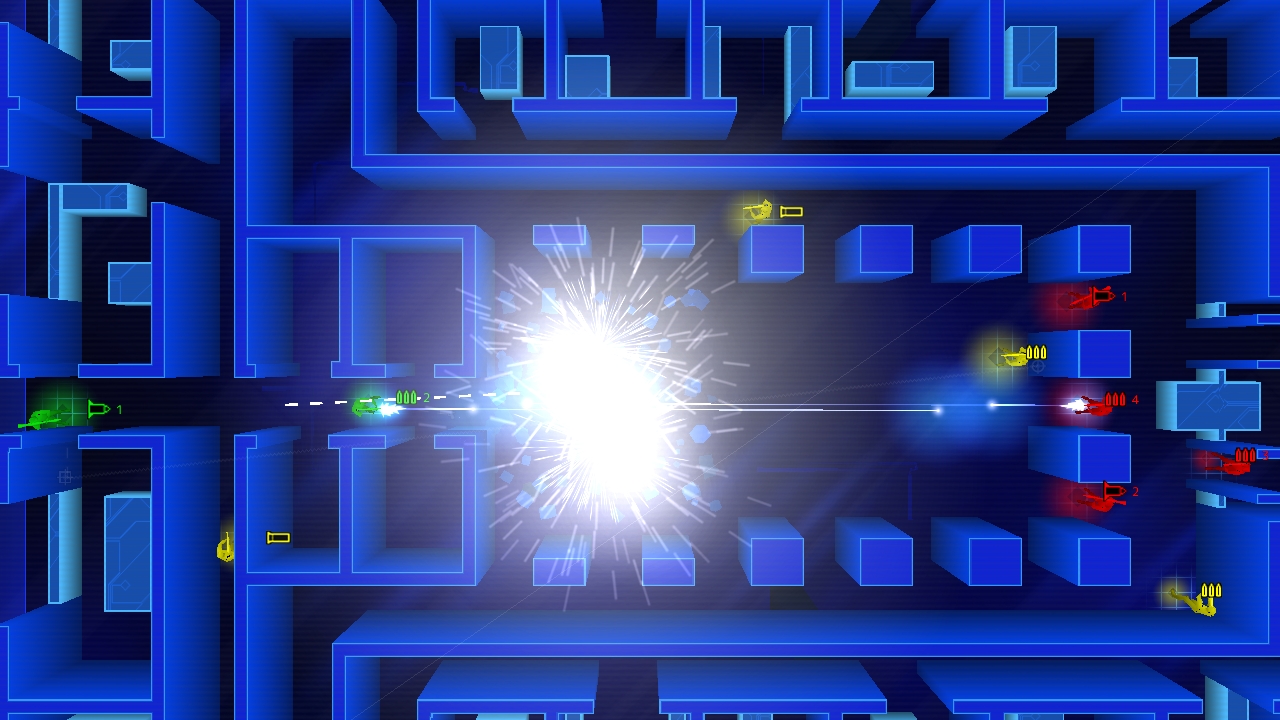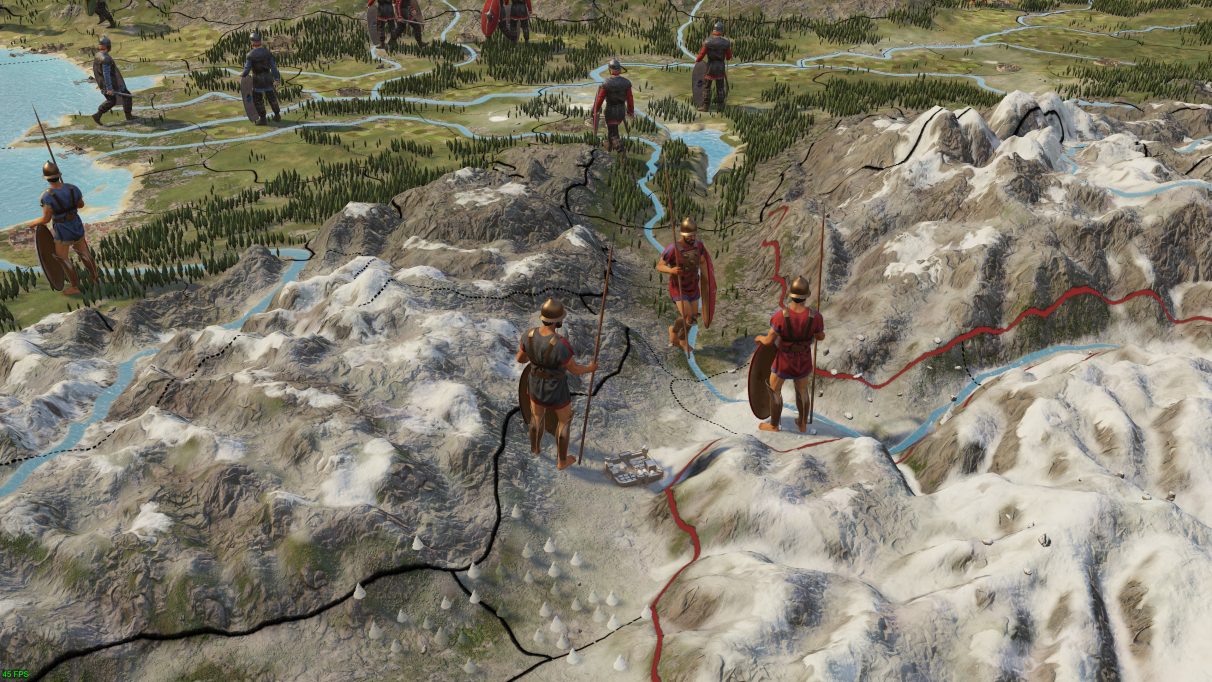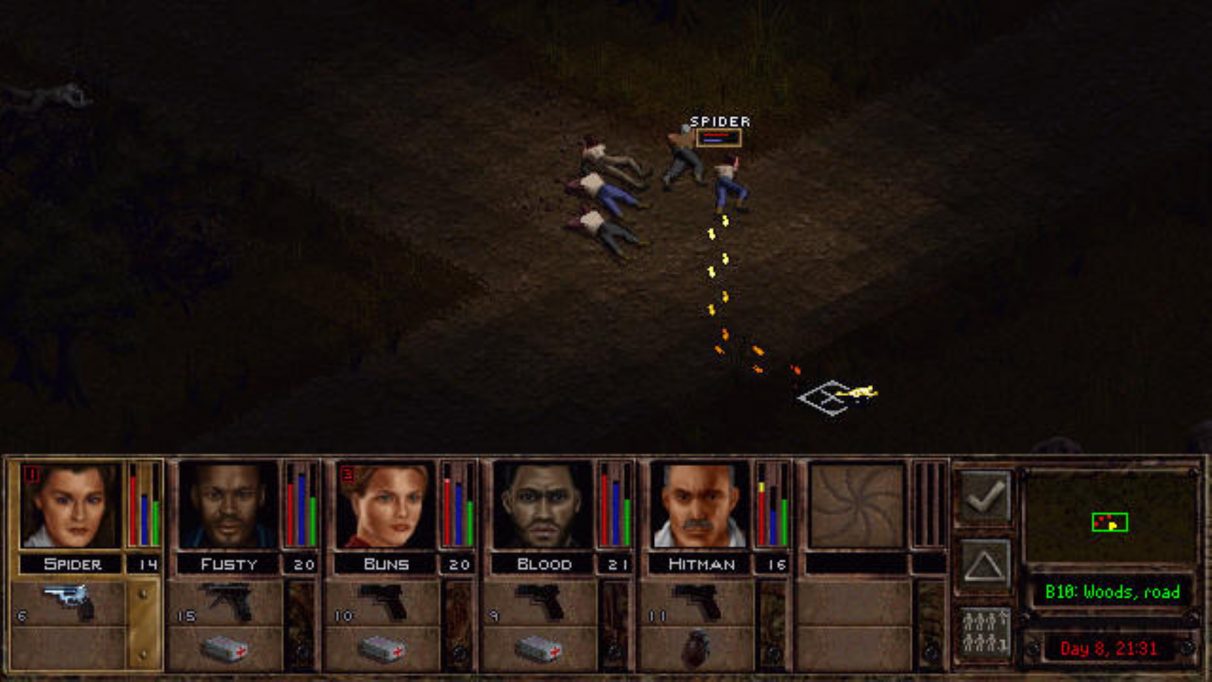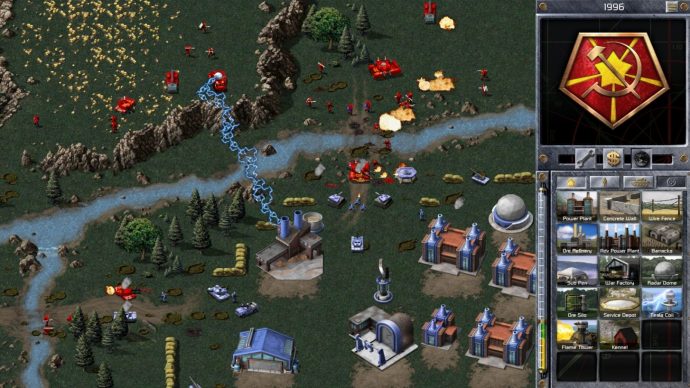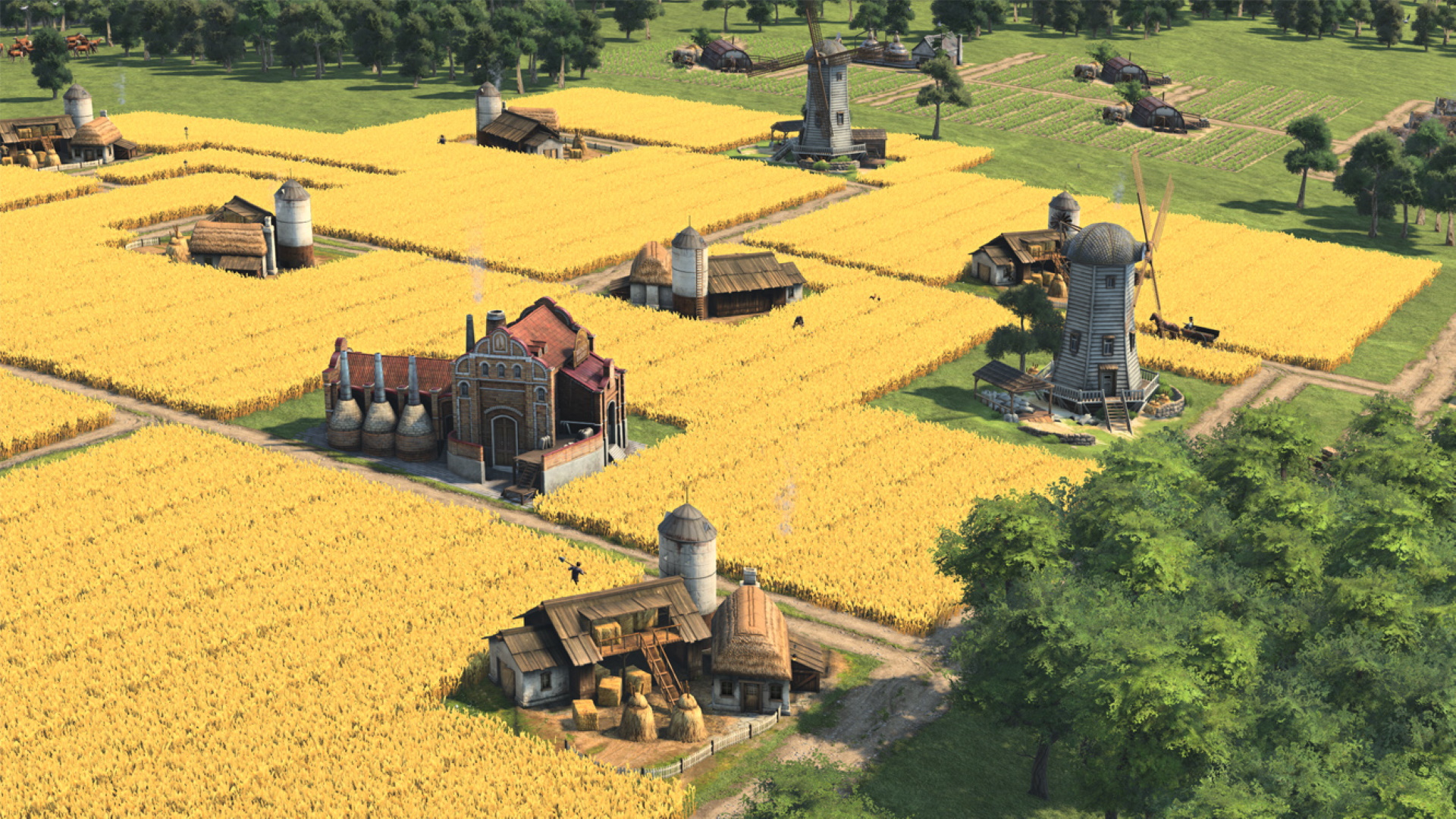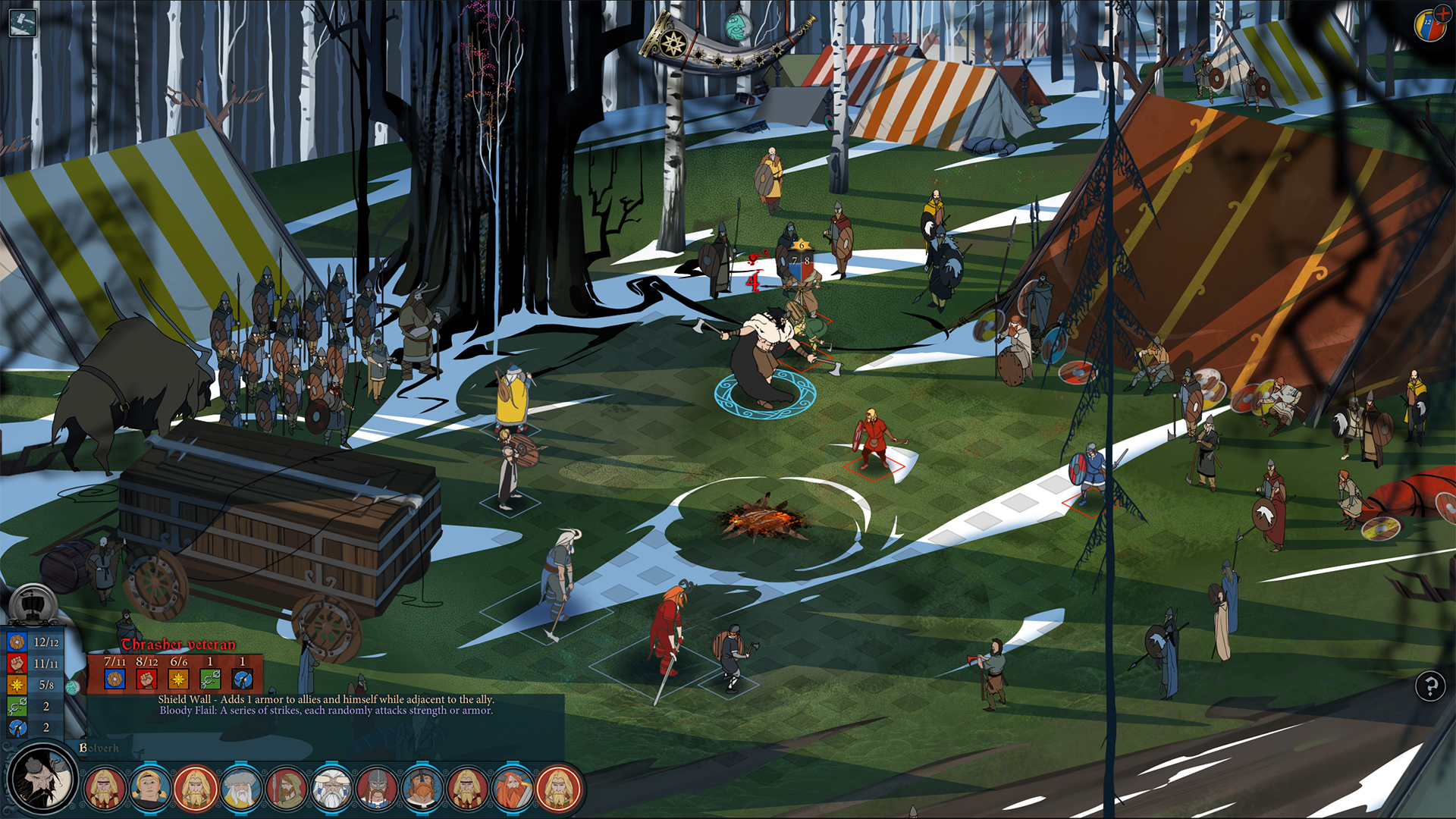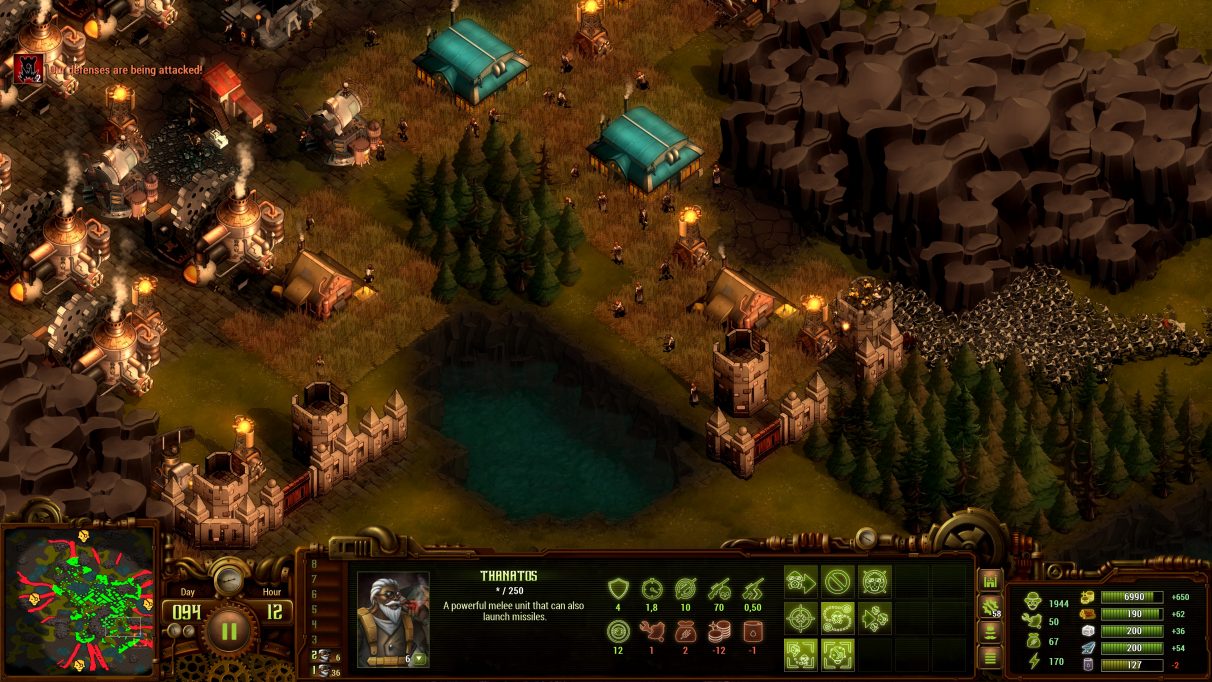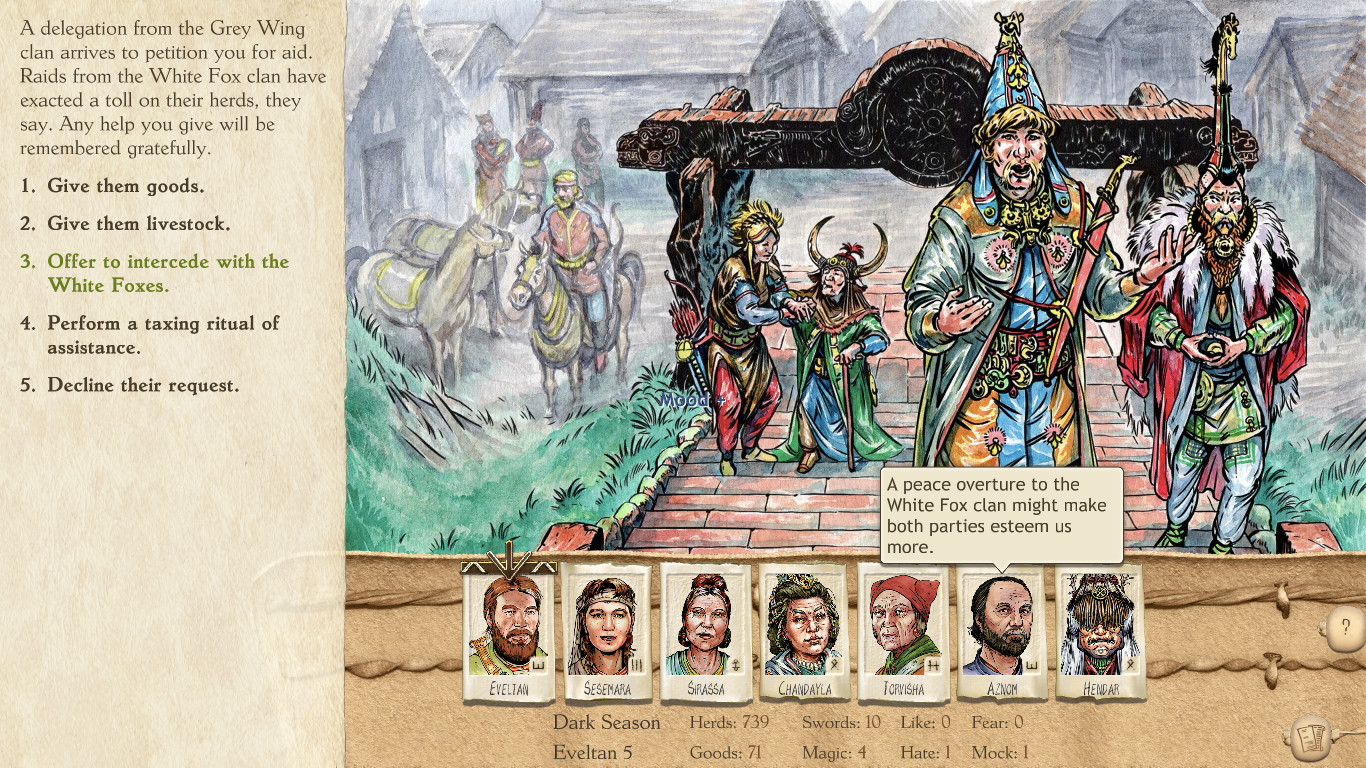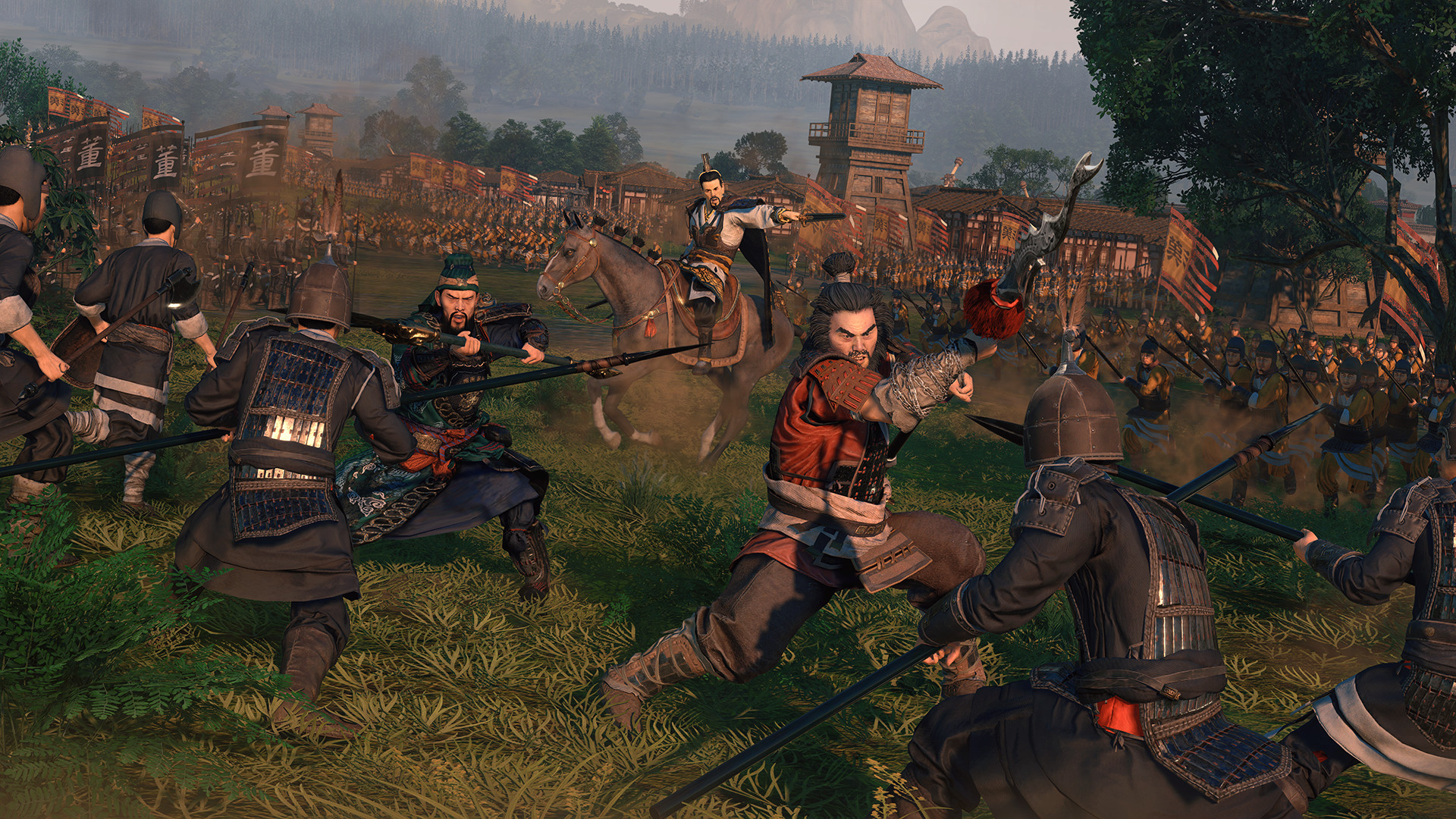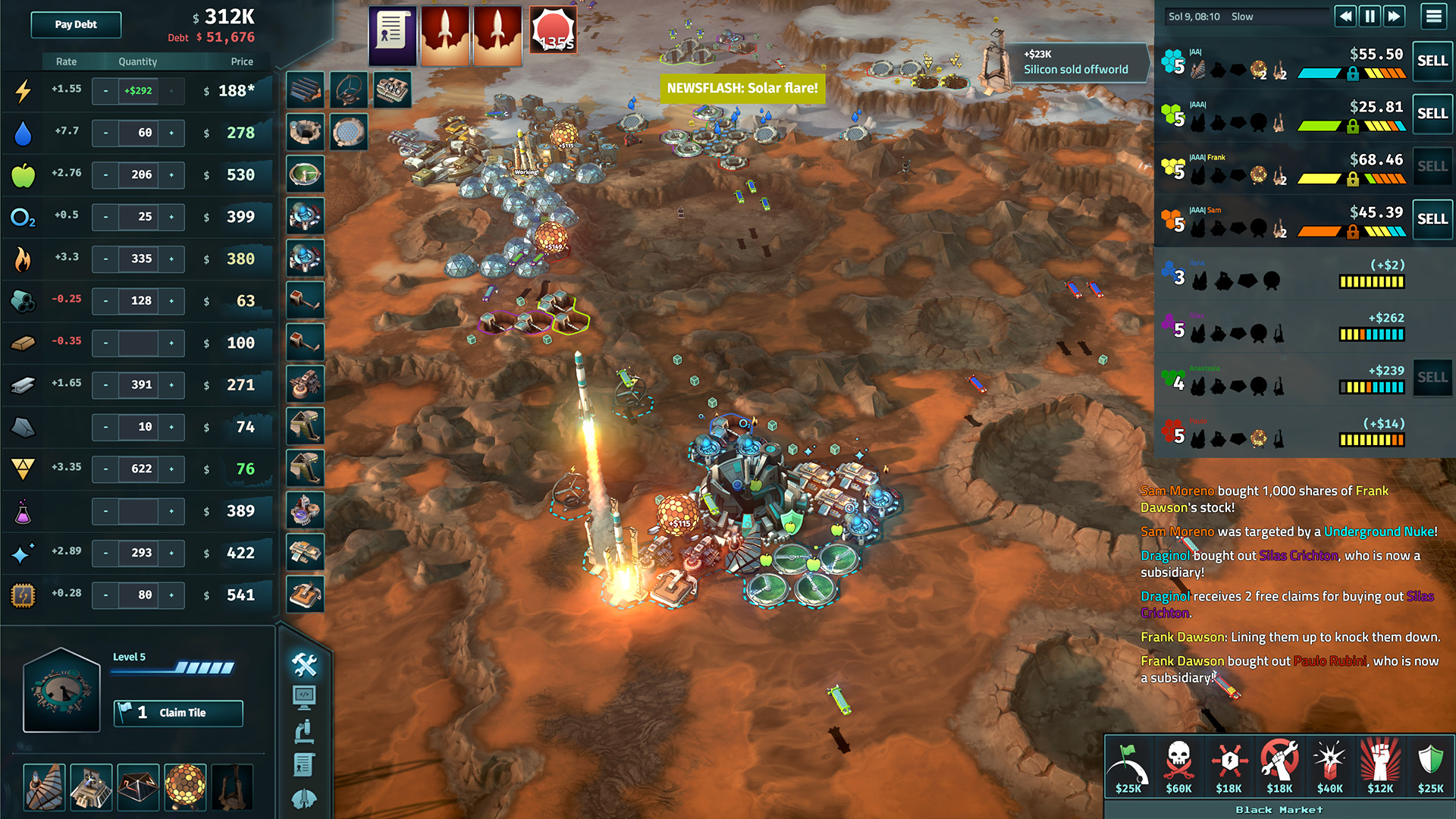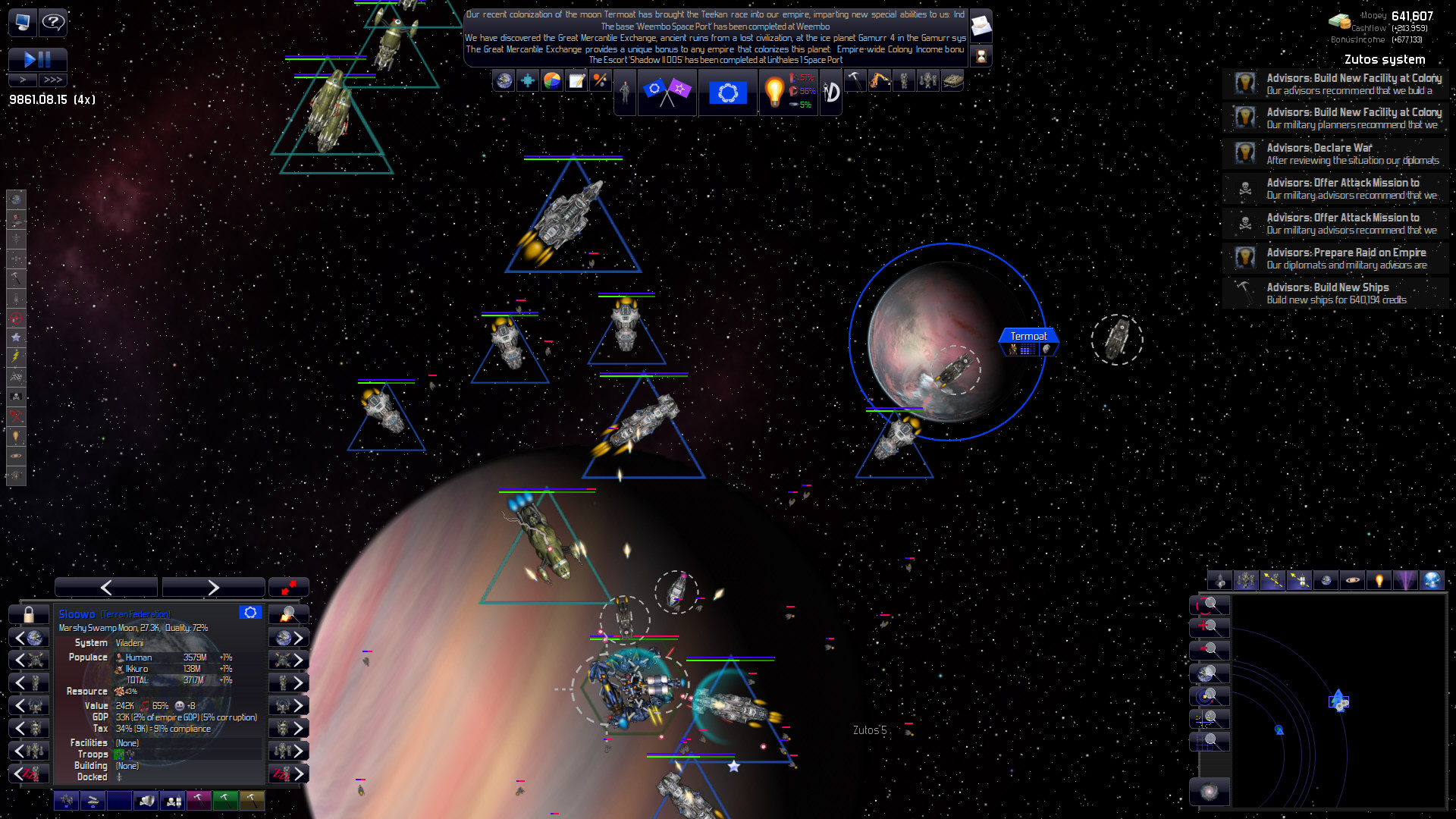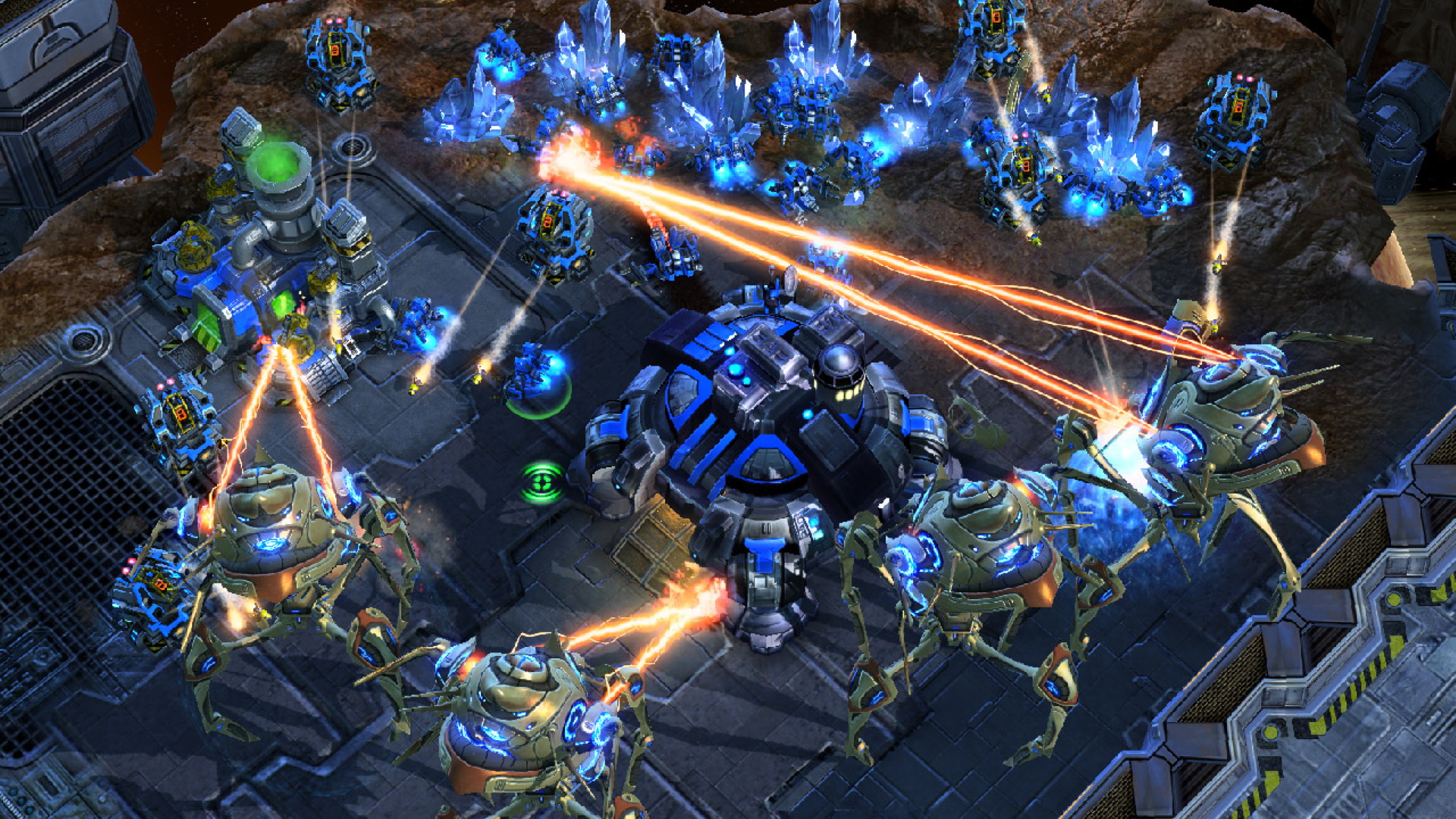The 50 best strategy games to play on PC
From tiny robot battles to grand historical warfare
Strategy games is an enormous genre in PC gaming, with real-time, turn-based, 4X and tactics games all flying the same flag to stake their claim as the one true best strategy game. Our list of the best strategy games on PC covers the lot of them. We like to take a broad view here at RPS, and every game listed below is something we firmly believe that you could love and play today. You'll find 30-year-old classics nestled right up against recent favourites here, so whether you're to the genre or want to dig deep for some hidden gems, we've got you covered. Here are our 50 best strategy games for 2023.
Best strategy games
In our list, we've mainly focused on strategy games about commanding troops of some kind, so if it's settlement or colony sim games you're after, then have a read of our best management games list. A handful of strategy games here do involve a bit of building, but there's no football management or spaghetti junctions. And if your favourite doesn't make the cut, please know it was number 51. If nothing else, it gives you a good excuse to tell us all about it in the comments below. You can also check out our readers' favourite strategy games of all time as well.
Finally, we've selected some of our top strategy highlights in the video above, too, if you prefer lists with a bit more audio visual flair. Our video ranking doesn't match this written list exactly, all told, but they're all games we'd recommend playing in a heartbeat.
50. Humankind
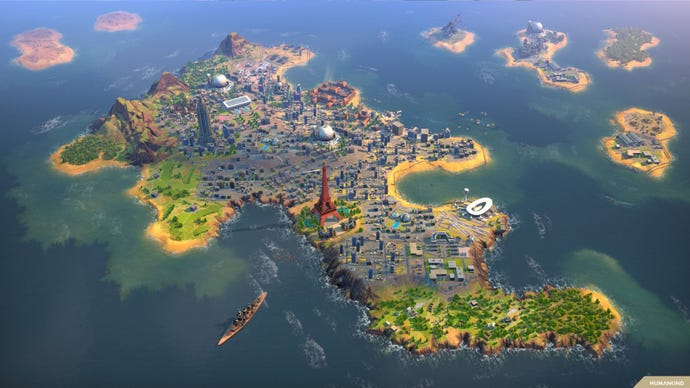
As soon as Amplitude announced their big historical 4X game, it was inevitable that comparisons would be drawn to the Civilization series. But Humankind is so much more than just a riff on Sid Meier's classic strategy franchise. Yes, there are several different technological ages to play through, but the most tantalising aspect of Humankind is how you can graft different cultures together to accumulate all manner of different perks and effects. Onscreen, that can mean having Japanese pagodas nestling right up to Mayan pyramids and Italian opera houses. In all, there are one million potential civilisation builds in Humankind, and it is absolutely thrilling.
At times, it's almost more puzzle game than 4X, giving it a distinctly different flavour to Civilization. With so many different combinations to sift through and take into account, it can be a little overwhelming in early playthroughs, but the way you can redefine your entire game plan on the fly, pivoting money-making dynamos into diplomatic powerhouses and research giants is also Humankind's greatest masterstroke. If you're tired of Civ, this is a very worthy heavyweight alternative.
49. Company Of Heroes
Company Of Heroes made World War II seem like new territory. It manages to marry the humanity of Band of Brothers with the ingredients of an RTS. Even as you send fresh troops into battle, replacing a squad who just died on a fool's errand of your own making, Company Of Heroes makes you believe that every soldier counts for something. That's partly due to the detailed depictions that the Essence Engine make possible, but it's also down to the careful pacing of the missions.
Has any RTS game handled both the calm and the storm as well as Company Of Heroes? Even when combat begins, there's usually a peppering of shots toward cover before casualties occur, and Relic ensure that you have time to react as a situation develops. Even though those soldiers are just pixels on a screen, don't be surprised if you find yourself making tactical choices that ensure their survival rather than the quickest possible route to success. The newest entry in the series, Company Of Heroes 3 is also well worth a look, too, but for us, the original still just about pips it to the post. Just.
48. Dune II Legacy
1992's Frank Herbert-adapting Dune 2 is the great grandparent of the real-time strategy game as we know it now, but a pleasant play experience today it most certainly is not. That's where Dune 2 Legacy comes in, an open source project that reworks Westwood Studio's Dune 2 into a new framework, giving it a more modern interface and graphical sensibilities.
The world has, of course, moved on since Houses Atreides, Harkonen and Ordos first went to war for control of the Spice of Arrakis, but a combination of straightforwardness, excellent vehicle, creature designs and devious treats such as the now-rare likes of stealing enemy buildings lends it a timelessly lurid charm. For a more modern Dune experience, Dune: Spice Wars is currently shaping up very nicely indeed in early access.
47. DEFCON
DEFCON is the strategy game most likely to make you wake up in a cold sweat. It's an abstract simulation of thermo-nuclear war, in which the tension rises along with the DEFCON level, and frantic deals lead to bitter betrayal. It's a game in which people are reduced to numbers (and ashes). Scores are measured in megadeaths inflicted and, in the default setting, causing a megadeath on an opponent's territory is worth two points while losing a million citizens in your own territory only loses one point. The value of life.
The presentation is immaculately sinister and minimalist, and while DEFCON is unlikely to keep you playing through the night, you might lose sleep anyway. The closest strategy gaming comes to horror.
46. Warhammer 40K: Chaos Gate - Daemonhunters
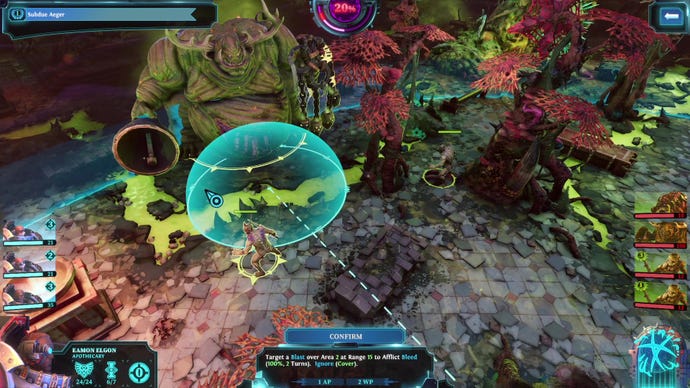
The first of many Warhammer games on our best strategy games list, 40K: Chaos Gate - Daemonhunters takes that classic XCOM formula, pumps it full of Gears Tactics protein shakes and chucks it into deep space for some dark fantasy plague-stomping. You play as a team of beefy Grey Knights in this chaotic tactics game, working to rid the galaxy of the terrible Bloom, which is slowly being spread across the stars by the agents of everyone's favourite god pal Nurgle. While cover still plays an important role here, these Knights play best when you're slicing off appendages up close and personal thanks to its Precision Targeting system, making them about as far as you can get from XCOM's squishy humans. The Bloom is constantly throwing new battle conditions into the mix, too, with enemies mutating and developing extra traits and buffs every couple of turns. If variety is the spice of life, this will definitely make your eyes water.
It doesn't let up between missions, either. Away from combat, there's also a compelling strategy layer of fixing up your damaged ship and researching further boons and bonuses, giving you plenty to think about on and off the battlefield. It's also just received the brilliant Duty Eternal expansion, which adds a giant mech lad to your party and lots more besides. Altogether, Chaos Gate - Daemonhunters is a thrilling mix, and most importantly, pokes enough fun at its own lore to make it approachable to non-Warhammer heads as well.
45. Marvel's Midnight Suns

One of the best superhero games you'll likely ever play, Marvel's Midnight Suns is frothy, fast-paced fun. Made by the same minds behind XCOM and XCOM 2, Midnight Suns brings its hero characters out from cover and puts them front and centre, its card-based battle system and interactive combat arenas offering up loads of tactical opportunities for proper comic book power moments. It also has a substantial RPG element to dig into between missions, giving you a window into what drives these superheroes, and what other issues they're dealing with, as the story progresses. Even if the MCU at large has ground you down over the years, Midnight Suns' playful writing makes these characters feel fun and fresh again, too.
But it's the card battles that really make Midnight Suns sing, and gradually honing your individual hero decks into the ultimate goon crushing machine satisfies all the same synapses in your brain as giving your XCOM squad the perfect loadout. Crucially, every hero has been designed to make you feel cool and powerful, with brilliantly choreographed moves and specials that amp up the smug factor to no end. It feels good biffing Hydra drones into cranes and seething hellpits, as it should do when you're playing as a bunch of powerful superheroes. That doesn't mean Midnight Suns is a pushover, though. Far from it, as its waves of swelling enemy ranks can attest. But that feeling of finally clearing them all out, while also dropping a crane on their head and shoving the rest into exploding barrels and live electrical boxes? It'll make you want to pump your own fists straight into the air.
44. Total War: Shogun 2
Arguments over which of Creative Assembly's historical battlefield sims is the best are a time-honoured tradition among strategy game obsessives, and you'll probably find a lot of those discussions tend to conclude with 2011's Total War: Shogun 2. In our own discussions, we concluded that 2017's Warhammer II and 2019's Three Kingdoms were the bestest best Total War games you can play today, but Shogun 2 is still one of Creative Assembly's all-time classics.
Set during Japan's warring states period, you are put in the samurai war flip-flops of one of the many warlords struggling for control of the islands during the 16th Century, and it gets hectic. The AI is well-tuned on both the strategic map and on the tactical battlefields (not always the case in Total War), and the campaign is paced with shrewd finesse: if you throw your weight around too much, the Shogun himself will paint a target on your head, and everyone will come at you like estate agents after a plate full of money. Thanks to this built-in tipping point, progression is a matter of careful calculation and time-biding rather than a wild land grab, and political thinking is just as important as good generalship. All this, for a game that's ostensibly about lining up troops on a battlefield and doing big stabs, feels somehow incredibly generous.
43. Northgard
Wyvern, armoured bears, shield maidens, draugr: on face of things, the viking mythology-styled Northgard is a return to the thematic outlandishness of late 90s/early-noughties real-time strategy, but it combines that joyful anything-goes quality with thoughtful, almost simulatory paths onward from build'n'bash tradition. There's a whole food ecosystem, the regular arrival of winter turns it into a survival game of sorts, you can trade with monsters and your choice of which clan you control affects your play style on a level far beyond mere unit options. It's very much a building game as well as a war game, but does a stand-up of job of keeping things lean despite how many plates it spins.
The single-player campaign plays a somewhat distant second fiddle to a beautifully drawn-out multiplayer mode that makes a virtue of tension as well as conflict, but whichever way you play, Northgard is without doubt one of the best RTS games of the last few years.
42. Unity Of Command
The perfect gateway game. Perhaps you've dabbled with a couple of 4X games and the occasional RTS, and now you want to step up to the plate and try your hand at a historical war game - Unity Of Command is precisely what you're looking for. It models all the smart stuff, including supply lines, but doesn't drown players in the details.
There's plenty for experienced war gamers to enjoy as well. Each map seems tailor-made to illustrate specific tactics that were utilised during the Stalingrad Campaign, and the expansions introduce fresh approaches that fit the historical realities of their new campaigns.
41. Warhammer 40K: Dawn Of War
Although Creative Assembly's Total War: Warhammer II remains one of the most popular Warhammer games you can play today, Relic's first Dawn Of War game is still the one of the best digital expressions of Games Workshop's Warhammer universe, having sadly not been surpassed by the latest game in the series, Dawn Of War III. It's the grimmest, darkest strategy game in existence, and while the game itself is more limited in scope than T'Warhammer, the 40K universe is a much stronger draw than the elves 'n' imperials fantasy world.
Dawn of War is steeped in the blood and weird theological war cries of the 40K universe, and manages to add enough thematically suitable twists to the RTS template to make the setting more than a fresh lick of paint. Better still, it's lived a long and rich life of both official and fan-made expansions, adding races, modes, units and even entire new rules aplenty - which is a big part of why this remains the ultimate Games Workshop RTS, even 14 years on.
40. OpenXcom (UFO: Enemy Unknown)
Revisiting Julian Gollop's masterpiece now, particularly in light of the excellent Firaxis remake and its sequel, can be a sobering experience. Why is it possible to send soldiers into battle without a weapon? And, come to think of it, why does X-COM, the planet's last hope, have to buy basic equipment? Why is the interface so unfriendly to newcomers?
Indeed, UFO is riddled with irritations. Fortunately, there's now OpenXcom, which takes the game apart and puts it back together again with a new code base designed to run on modern computers. It also means it's free from all the irritating bugs and limitations that played the original, and you can mod it. You can still buy the original if you really want, but OpenXcom is definitely a more enjoyable experience in 2020. Of course, the Firaxis remake is even better today, but when you're in the thick of a terror mission, with chrysalids seemingly pouring out of the walls, or in those last hours when you finally seem capable of taking the fight to the aliens, there's still nothing else quite like X-COM. Not even XCOM.
39. Supreme Commander: Forged Alliance
In the beginning, there was Total Annihilation. The year is 1997, the year that Duke Nukem Forever went into production. Cavedog's RTS went large, weaving enormous sci-fi battles and base-building around a central Commander unit that is the mechanical heart of the player's army. Supreme Commander followed ten years later. Total Annihilation designer Chris Taylor was at the helm for the spiritual successor and decided there was only one way to go. Larger. Initially, it's the scale that impresses. Starting units are soon (literally) lost in the shadow of enormous spiderbots as orbital lasers chew the battlefield to pieces.
Spectacle alone wouldn't make Supreme Commander one of the greatest RTS games ever released, however, and there's plenty of strategic depth behind the blockbuster bot battles. It's a game in which the best players form their own flexible end-goals rather than simply rushing to the top of the ladder. Yes, there's a drive toward bigger and better units, but the routes to victory are many - some involve amphibious tanks, others involve enormous experimental assault bots and their ghostly residual energy signatures. Indeed, we recommend playing Supreme Commander: Forged Alliance these days, which is a standalone expansion to the base game. This adds loads of extra units, an entirely new faction, new maps and a new single-player campaign, and it's a better sequel than the actual sequel.
38. Imperialism 2
One of the hurdles strategy games often face is finding the challenge and fun in tasks and themes that don't immediately seem attractive or entertaining. War games and theme park management have certain, obvious appeals, but when taxation and logistics seem to be the order of the day, a game can quickly look a lot like a job. Imperialism 2 is one such game.
Although its scope is impressive and the idea of ruling a country and building an empire is potentially exciting, SSI's game focuses on labour and resource management, and is mainly about solving problems of supply and economics. That it succeeds in making these elements of rule both engaging and relatively accessible is down to the strength of the design. By concentrating on logistics, Imperialism and its sequel become games about the big picture that the smaller details are part of, rather than lists of numbers and complicated spreadsheets. Micromanagement is out and important nation-wide decisions are well and truly in.
37. Slipways
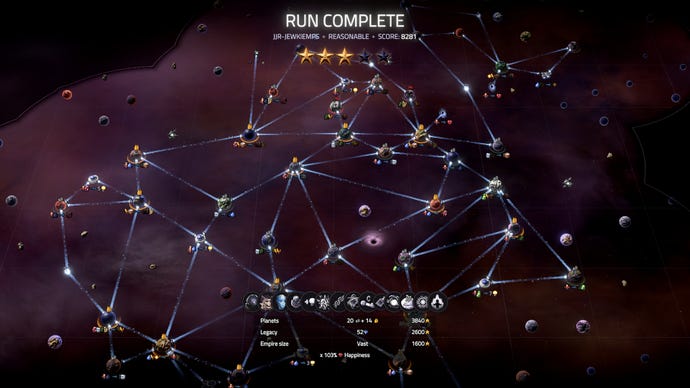
Some might call Slipways a 4X-lite. We prefer the term 'grand-strategy-themed puzzle game'. For starters, it's a lot more immediate and moreish than other go forth and conquer space operas, as here you're tasked with creating a prosperous network of interlinking planets, keeping resources flowing to make sure everyone's got the thing they need to thrive. The catch? The titular slipways can't overlap, so you'll need to be thinking a few steps ahead with every expansion.
Trust us, keeping everyone happy - Slipways' version of civic and public order - is no small task. If planets start getting antsy, then you run the risk of getting booted out of office, presumably into the cold coffin of space, ending your run. But here's the thing, most runs last a couple of hours tops - 45 minutes if you're good - making it much easier to dip your toe into if you're too time-starved for yet another pop at Stellaris or Crusader Kings 3.
36. Dominions IV
From archfiends to gods. Wannabe gods. Pretenders. Dominions IV, like Solium Infernum, can be off-putting at first. It has a complicated rule-set that takes a few playthroughs or a determined study of the monstrous manual to understand, and even when a session begins, following the flow of action can be difficult. That's despite the game being separated into tidy turns, with distinct sets of instructions to put into action. There are cities to build, victory points to secure and armies to move around the randomly generated maps.
That tricksy rule-set, along with a combination of graphics that are functional at best and a demanding interface, can make the basics hard to grasp. Or perhaps it's that there are no basics. Break through the hard crust, however, and there are rich veins to tap into. The clash of deities isn't a re-skin of monarchs or emperors at war - there are disciples to nurture, totems to worship and all manner of nations that can be subject to the whims of the possibly-tentacled pretenders.
35. Endless Legend
Endless Legend is unspeakably beautiful. Every part of it was made with care and thought, and a commitment to making an often formulaic sub-genre interesting and strange and enticing. Each world asks to be revealed, each faction stokes curiosity. There are the bizarre cultists and their sole, massive city, who fanatically raze anything they conquer after they've learned what they can from it. There's the dour Broken Lords who are haunted suits of armour, unable to use food but able to reproduce with 'dust', the game's mysterious magical currency, which itself is key to why one of our favourite factions, the Roving Clans, are so interesting. They're nomads obsessed with collecting dust to unlock its true power. They're totally unable to declare war, but they get a cut of every market trade and can hire the best mercenaries.
In addition to the expansion and conquest, there are story arcs to follow by sending armies to the right places, which themselves can drive conflict or political wrangling. From the faction-specific units on the turn-based tactical battles to the esoteric faction rules that even, god help us, invite roleplaying, everything about Endless Legend aims to take strategy games somewhere new and better.
34. Druidstone: Secret of the Menhir Forest
From some of the team behind the dungeon crawling Legend of Grimrock games, this turn-based tactics game offers just the right balance between Into The Breach-style solution-finding, and improvisational disaster mitigation along the lines of XCOM. Using a small party of three (and later four) characters, upgraded between battles in classic RPG style, players must navigate thirty-five extremely well-designed missions, completing core objectives to progress and nailing secondary objectives to gain extra upgrade resources.
With no enforced single sequence to mission order, and with replaying missions to complete secondary objectives being encouraged, it's very rare to feel stuck, despite some pretty challenging situations. The whole package is wrapped in a lush and surprisingly cheery fantasy dressing, with dialogue that's more endearing than it needs to be, and a merry sense of adventure. It's not the longest game by any means, but the handcrafted nature of each mission, as well as the impressive variety of enemies, puzzles and objectives encountered, mean that things never start to feel stale.
33. Rise Of Nations
Although it's not often regarded as part of the pantheon of strategy games, Rise Of Nations is the closest thing to a real-time take on Civilization that we've seen. Spanning the history of warfare from catapults and caravels to submarines and stealth bombers, it's a game of territorial control and long-term decision-making that could be mistaken for a simplified war game.
Incorporating resource management, attrition, formations and tactical use of terrain, it's a complex and rewarding game that sold exceptionally well at release but doesn't seem to have fuelled discussion in the way that many of its contemporaries do. As the last original game designed by Civ II creator Brian Reynolds, it stands as a suitable book-end to his career so far, but hopefully not an endpoint.
32. Battlefleet Gothic: Armada 2
Following on from the adaption of the Total War formula to the Warhammer fantasy setting, 2019's Battlefleet Gothic: Armada 2 proved yet again that not all Games Workshop licences gravitate towards dangerous mediocrity. It pushes a lot of the same buttons as Total War. You build up persistent multi-unit forces on a campaign layer, then position them on a tactical map and shove them into the enemy in a long, grinding bout of micromanaged carnage. The difference is that you're battling with baroque, city-sized starships crewed by millions of lunatics.
Of course, it's nothing like what actual space combat would resemble, being played on a 2D field - it's more like WWI-era battleship combat, embiggened to fit the maximalist aesthetic of Warhammer 40K. Even so, it's got that level of internal consistency that suspends all disbelief. If anything, the strategic game is a little light, but not so much that it feels stripped down, and there's an impressive level of narrative customisation for each of its three playable factions - the obvious humans, the Very Very Hungry Caterpillars a.k.a the Tyranids, and our personal favourites, the miserable ancient Egyptian space terminators known as the Necrons. However and whatever you choose to play, you're guaranteed one hell of a light show.
31. Galactic Civilizations 2: Endless Universe
Galactic Civilizations 2 succeeds by sticking to the basics. That's not to say there's anything basic about the game itself, but there are no unexpected twists. You take control of a space-faring race and you conquer the galaxy, just as the 4X gods intended. Stardock's game succeeds by implementing all of the expected features - diplomacy, economics, planetary management, warfare - in an enjoyably solid fashion.
The AI is notable, both for the challenge it offers and the way that it operates. Although it does receive boosts at the highest difficulty levels, there's also a credible attempt to simulate counter-strategies tailored to the player's actions. The Endless Universe release, or Ultimate Edition, is also bundled with the two expansions, one of which adds the ability to destroy solar systems.
30. Heroes of Might and Magic III
Heroes of Might and Magic III is almost perfect. The strategic portion of the game manages to instil resource gathering and experience grinding with the excitement of exploration and questing, while the tactical battles rarely become rote despite the limitations of an 11x15 hex map. It's a wonderful example of several simple concepts executed well and locked together in a whole far greater than the sum of its parts.
A huge part of the game's success lies in its approach to progression. As is often the case in strategy and RPG games alike, the goal in each scenario is to uncover a map and make all of the numbers go as high as possible. Build lots of units, level up heroes and gather gold until there's no space left in your coffers. New World Computing ensure that there's always something interesting behind the fog of war, however, and that every step toward victory feels like a tiny fantastic subplot in its own right. Just look at the towns for proof - every building and upgrade feels like an achievement, and part of a beautiful, fantastic tapestry.
29. Neptune's Pride
If you had to describe Neptune's Pride in a few words, it'd sound like almost any other game of galactic conquest. Planets and ships can be upgraded, and, as ever, you'll be trying to gather as much science, industry and money as possible. Simple. The twist in this particular tale is the speed of the game - or, perhaps, the distances involved. Sending a fleet to explore, invade or intercept takes hours. There's no way to speed up the passage of time so what to do while waiting?
Neptune's Pride is not one of those freemium games that allow you to buy gems (why is it always gems?) to hurry the process along. Instead, most of the game takes place in the gaps between orders, as alliances are forged, promises are made and backs are stabbed. Due to the long-form nature of a campaign, Neptune's Pride will live with you, needling at the back of your mind, and you'll find yourself switching strategies in the anxious early hours of the morning, betraying friends and playing into the hands of your enemies.
28. Warhammer 40,000: Mechanicus
Most XCOM-alikes end up disappointing, but Warhammer 40,000: Mechanicus managed to achieve a decent enough treatment of XCOM's turn-based combat sub-genre, while adding enough creative idiosyncrasies to make it thoroughly charming in its own right. You play as a faction of deranged cyborg techno-monks, plundering the depths of an alien tomb in search of ancient technologies, enlightenment, or sometimes just additional fuel for your knackered starship. Needless to say, the tomb is the resting place of countless miserable metal skeletons (yep, it's those necrons again), who want to chase you out with a rolled-up newspaper made from searing green radiation.
This is an adventure that captures that 'one more mission' addictiveness, and it's superbly written, too. The various bickering cyber-clerics behind your expedition are genuinely memorable characters, and you find yourself gripped - and occasionally even laughing - as their story unfolds in between missions. The game's also dripping with atmosphere, with moody battlefields, light choose-your-own-adventure elements in between fights, and a grimy industrial soundtrack that sounds like what a bunch of Gregorian monks might create if given access to an abandoned factory, a synth setup, and more than a little ketamin.
27. BattleTech
On the face of things, BattleTech might look like XCOM with giant robots, but those big metal suits aren't just there for show - they're what makes BattleTech so distinctive. A big ol' mech doesn't much care when it loses an arm, for instance - it just keeps on fighting. Working out how to down these walking tanks both a) permanently and b) in a way that preserves enough of it to take home and use as parts to build a new one yourself is the key strategy here. You'll have to juggle positioning, range, ammo and heat as these 80-ton titans clash in tense turn-based battles, while the meta-game involves steadily collecting enough salvage to raise yourself an army of building-sized steel Pokémon.
BattleTech is sometimes too slow for its own good (though mods and a patch address this), but stick with it and it becomes an incredibly satisfying game of interplanetary iron warfare and robo-collection.
26. Frozen Synapse
For five seconds at a time, Frozen Synapse allows you to feel like a tactical genius. You provide orders for your team of soldiers and then watch as enemies waltz right into your line of fire, or find themselves caught between a rock and a hard place, right on the killing floor. The next five seconds might flip everything around though, leaving you feeling like a dolt.
The beauty of Mode 7's clean and colourful game is that it plays on confidence and intuition rather than detailed analysis. Each 1v1 round of battle takes place on a randomised map, both participants draw up their orders and then execute simultaneously. If you know your opponent's style you might be able to flush his/her units out, or wait for them to show themselves. Maybe you'll have to take on the aggressive role, knowing that this particular enemy commander prefers to set up an ambush and wait. In a few short minutes, you'll perform flanking manoeuvres, lay down covering fire, attempt to breach and clear a room, and watch in horror as everything goes wrong again. But when a plan comes together? You're a genius again, for at least five seconds more.
25. Imperator: Rome
Imperator's launch was met with a seriously mixed reaction from devotees of Paradox Development Studio's grand strategy games, but we personally felt it stood toe to toe with the strongest of its stablemates. With its window of play opening in 304 BC, the game follows the formula set by 2000's Europa Universalis: you're presented with a map of the world, on which you can examine every discrete political entity that existed at the time, before choosing one to pilot onwards through time.
It's a great moment in history to choose, with Rome poised between early collapse and expansion into a continent-eating juggernaut, Carthage lurking in the wings, and everything to play for in the chaotic fallout of Alexander's empire. Rome itself is a beautiful headache to play, with internal politics and infrastructure growing harder and harder to manage as the legions seize more territory: it's a game that's less about building an empire, and more about holding it together. For those who weren't happy with Imperator at launch, it's already undergone several transformative (and free) patches to address player criticism, and the reaction from fans seems to be encouraging. If you've not dipped into it so far, now's a good time.
24. Jagged Alliance 2
It's incredible to think that nobody has taken Jagged Alliance 2 on face to face and come out on top. There are other games with a strategic layer and turn-based tactical combat, sure, and there are plenty of games that treat mercenaries, guns and ammo in an almost fetishistic fashion - but is Jagged Alliance 2 still the best of its kind?
Doubts creep in every once in a while and, inevitably, that leads to a swift re-installation and several days lost in the war for Arulco. Jagged Alliance 2 is still in a class of its own and despite the years spent in its company, it's hard to articulate the reasons why it has endured. The satisfaction of gaining territory in the slow creep across the map is one reason, and the tension of the tactical combat is another. Even the inventory management feels just right, making every squad the equivalent of an RPG's party of adventurers. But it's the character of the squad members that seals the deal. Each has enough personality to hang a hundred stories on - remember the time Fox bandaged Grunty's wounds in the thick of a firefight a turn before he bled out, or the time Sparky made an uncharacteristically good shot and saved an entire squad's bacon? If you don't, go play Jagged Alliance 2 and make some memories.
23. Command & Conquer Remastered Collection
In truth, the long-running Command & Conquer series has never been one single thing, but in popular memory it tends to be defined by a combination of accessible but explosive build'n'bash warfare and gloriously daft sci-fi soap opera FMV cutscenes. The Remastered Collection revamps the original Command & Conquer and the first Red Alert, plus all associated expansion packs, in a manner that makes them look like they do in those same memories. It's glorious.
C&C remains peak '90s RTS, from a time when the genre seem unassailable, and it remains fiendishly playable, just challenging enough, and filled with campy delight. To EA's enormous credit, the Remastered Collection does those old games proud, rendering ridiculous FMV in modern resolutions, turning pixelated sprite art crisp, applying UI improvements from later games back to the original, as well as rebuilding the multiplayer, adding a map editor, and more. It's a great package - and heck, worth it for the remastered music alone.
22. Gears Tactics
Gears Tactics is, as its name might suggest, a turn-based tactics game set in the beefy, growly world of Gears Of War. An odd combination, you might think, but this is a game whose veins run deep with the same kind of deep, tactical prowess as your X-COMs and, err... XCOMs. Against all the odds, it really does turn out that, even in the preposterously hench world of Gears, the mind really is the strongest muscle.
Its campaign is a smoothly designed, relentlessly paced squad 'em up that eschews everything in its genre territory except for the actual tactical battling, and it does that exceedingly well indeed. Its mechanics are built to emulate the aggressive, horde-mowing-down playstyle of its brick-chinned FPS dad, and you'd be amazed how well that translates to a completely different genre. The only notable omission is the lack of any strategic or management meta-game once each battle is over. Instead, it's back to the battlefield with your newly looted gear and skills you've gained from levelling up. That may not be everyone's cup of protein tea, but if you've always tended to enjoy the fights of XCOM rather than spending time hanging around your base, this is the tactics game for you.
21. Anno 1800
The latest in Ubisoft's series of semi-historical colony managers, Anno 1800 covers the transition from the age of sail and small-scale farming to the era of thundering engines, electricity and hellish abattoirs we all know and love. As well as offering competitive real-time city-building against both AI and human opponents, Anno also has an extra layer of built-in maritime RTS where you direct a small fleet of ships to trade, explore, carry out reward-based missions, fight pirates, or assault your competitors.
It can get hectic at times, with at least two separate maps (new and old world) in play at any one time, but it means you're never, ever short of something to do. Anno 1800 is also thoroughly gorgeous, with coastlines and jungles that thrum with exploitable beauty, and complex, varied building animations that make it genuinely worth it to zoom in on your streets and see what's going on.
20. The Banner Saga
The Banner Saga is an epic turn-based strategy series whose story spans across three separate games. While The Banner Saga 2 is arguably the best one in the trilogy, introducing more enemy types and classes to keep things interesting, this is very much the second act of the game's wider narrative, so it's definitely worth playing right from the start.
The pseudo-rotoscope, Norse-themed art is glorious, but what gives The Banner Saga as a whole its staying power is that it's a sort of rolling mood more than anything else. A disaster-strewn trek across a dying land, multiple, oft-changing perspectives, awful decisions with terrible consequences made at every turn, more a tale of a place than of the individual characters within it. The feel of Banner Saga is what's most memorable, elevating choose-your-own-adventure tropes into real atmosphere. There's a reasonably robust turn-based combat system in there too, in which you regularly get to field armies of horned giants. A few punches are pulled, perhaps, but The Banner Saga has far more substance than might have been expected from a game which seems so very art-led.
19. They Are Billions
They Are Billions takes real-time strategy, tower defence and zombie survival, and combines it all into a single punishing, rewarding, delicious experience. It's one of the rare games that succeeds in its Frankenstein-esque genre splicing, and Numantian Games have only made it bigger and more beautiful since coming out of early access. The year is 2260, and after one of those classic zombie apocalypses that ravage the earth, the remnants of this steampunk-infused world now live inside a huge walled city to keep out the undead nasties. But no more! In They Are Billions' sprawling campaign, you must colonise new outposts in the world around you, building new communities from scratch while protecting them from the hungry hordes.
The special thing about They Are Billions, though, is the way it keeps you scared and on your toes even during moments of relative peace. The way it leaves you to slowly explore outwards from the centre of the map and see just how many thousands of zombies are waiting for you, just beyond the borders of your city. The way it generates such fantastic, characterful anecdotes of Achillean heroism and Sisyphean despair. It all adds up to a delectable experience that keeps you coming back even after it defeats you time and time again and, more importantly, even after you finally complete it, too.
18. Six Ages: Ride Like The Wind
Six Ages works as a strategy game because it's about influencing people, not just accumulating resources. Cattle and horses and food are vital, sure, but they're not everything, and you need to gauge many things that can't be counted. How the Grey Wings feel about you isn't presented as a number or bar, but what your traders and diplomats have to say. You're leading a village in a dangerous land of magic, religious conflict, and looming environmental crisis. Yes, it has bags of personality as your advisors snark and ramble and complain, and you explore the alien values of this colourful, yet malleable culture, but there are hard strategic decisions to make every year, even if the decision is to stay the course.
Success is about making good decisions in its many events, but also directing your clan's long term efforts behind the scenes. Where do you explore and when? Will your precious magic supplement your crafter this year, or is it time to risk a ride to the gods' realm to secure a special blessing? And those decisions can never be fully divorced from the wider situation. The ideal solution might be obvious but unaffordable, or contradict another plan you have going. Measuring all these political, economic, military, religious, and sometimes personal factors up against your long-term plans is a storytelling delight and a cerebral challenge all at once.
17. Total War: Three Kingdoms
Creative Assembly's historical Total War games have been going from strength to strength in recent years, and 2019's Three Kingdoms is arguably the best one yet. Set during China's titular Three Kingdoms period in the second and third century and based on the fourteenth century novel Romance Of The Three Kingdoms, this is the most dramatic and personal Total War game yet, making for some thrilling, real-time combat and some truly incredible stories.
For the most part, it's classic Total War. A large part of your time will be spent building towns, recruiting soldiers and moving your armies across a map of China as you try and unite your shattered land, but what sets Three Kingdoms apart is its intense focus on your individual clanspeople, giving each campaign a very human and emotional core from which to build your strategy from. Never before have we felt so invested in our Total War soldiers, and victory has never tasted sweeter (or defeat more gut-wrenching) as a result. Sure, it ends up leaning more toward the 'romance' side of history than the cold, hard factual take we're used to seeing from a Total War game, but for us, it's all the better for it. If you're new to the series, Three Kingdoms is also the best place to start by a country mile, as both the campaign and its combat are easier to understand than ever before.
16. Offworld Trading Company
It's a rare thing to find a game that slots neatly into a genre but doesn't seem to follow many - if any - of the established rules of that genre. Offworld Trading Company is one such game. It's about offworld colonies, except you're not worrying about keeping your population happy and healthy. It's about making big profits, but money is a fluid thing rather than the central resource.
It doesn't contain direct combat, but it's one of the most ruthless and competitive games you're ever likely to play. Created by a team led by Civilization IV designer Soren Johnson, Offworld Trading Company is a game about the impact of decisions. Everything, even hesitation, creates change, and because the foundation of the entire game is in flux - the numbers that drive everything visible and entirely predictable - it creates a space where you become proactive and reactive simultaneously. It's impossible to act without influencing the status and decision-making of your competitors, and by the time the impact of one change has been felt, another handful have already happened.
15. Distant Worlds: Universe
By allowing the player to hand over the reigns of responsibility, Distant Worlds makes everything possible. It's space strategy on a grand scale that mimics the realities of rule better than almost any other game in existence. And it does that through the simple act of delegation. Rather than insisting that you handle the build queues, ship designs and military actions throughout your potentially vast domain, Distant Worlds allows you to automate any part of the process. If you'd like to sit back and watch, you can automate everything, from individual scout ships to colonisation and tourism. If you're military-minded, let the computer handle the economy and pop on your admiral's stripes.
As well as allowing the game to operate on an absurd scale without demanding too much from the player in the way of micromanagement, Distant Worlds' automation also peels back the layers to reveal the working of the machine. It's a space game with an enormous amount of possibilities and by allowing you to play with the cogs, it manages to convince that all of those possibilities work out just as they should.
14. Europa Universalis IV

The Europa series feels like the tent-pole at the centre of Paradox's grand strategy catalogue. Covering the period from 1444 to 1821, it allows players to control almost any nation in the world, and then leaves them to create history. A huge amount of the appeal stems from the freedom - EU IV is a strategic sandbox, in which experimenting with alternate histories is just as (if not more) entertaining than attempting to pursue any kind of victory. Not that there is such a thing as a hardcoded victory.
Providing the player with freedom is just one part of the Paradox philosophy though. EU IV is also concerned with delivering a believable world, whether that's in terms of historical factors or convincing mechanics. With a host of excellent expansions and an enormous base game as its foundation, this IS one of the most credible and fascinating worlds in gaming.
13. Mutant Year Zero: Road To Eden
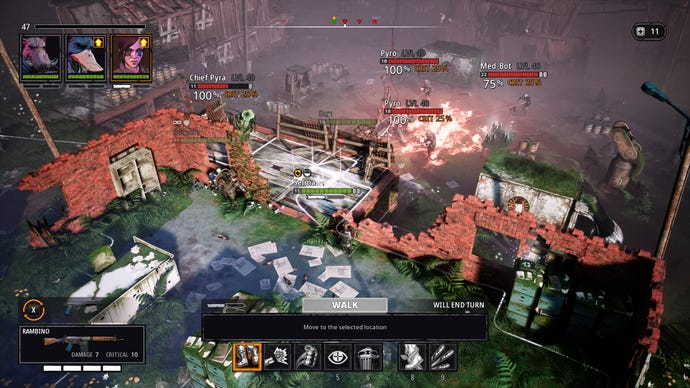
A duck and a boar walk into a bar... sounds like the setup for a terrible joke, is actually the beginning of a quite excellent tactical adventure based on the tabletop RPG of the same name. Of course, walking in anywhere is ill-advised in Mutant Year Zero, a game that hinges on you sneaking through large playpens to choose your angle of attack or pick off stragglers to thin the horde before noisy turn-based tactics commence.
It's the viability/necessity of stealth that gives Mutant Year Zero its distinct flavour, as you study awareness ranges, split and slink your party of three into ambush points and pray that probability is on your side. What could easily devolve into sterile optimization is spiced up with quirky mutation abilities - mind control, butterfly wings, weaponised gardening - and a pool of heroes you'll switch between to meet the varied challenges of bandits, robots and mutants.
It's also a rare game to achieve a lot of storytelling with little interruption, as short, characterful banter establishes our warriors and fills in the gaps in the enjoyable lore - it's our world, but set in a distant enough future that everyday junk has taken on mythic importance. It's funny and light on its feet, and how many games in this list can claim that? For extra fun, get the Seed of Evil DLC, too - it has a fire-breathing moose. How many games in this list can claim that?
12. StarCraft II
StarCraft II is the Platonic ideal of the micro-heavy multiplayer RTS game. Watching expert players at work is bewildering, as the clicks per minute rise and the whole game falls into strange and sometimes unreadable patterns. According to the StarCraft Wiki, a proficient player can perform approximately 150 productive actions per minute.
"Oh bother", you might be thinking, "I usually only click my mouse 150 times a year unless I'm photoshopping bees onto a picture of a politician's face." Fear not. StarCraft II may be included here because it has perfected an art form that only a dedicated few can truly appreciate, but its campaigns contain a bold variety of missions, and bucket loads of enjoyably daft lore. Though its dour single-player campaign is a big ol' nope in terms of storytelling, most recent expansion Legacy of the Void has an Archon mode that even offers two-player coop, so you can share all of those actions per minute with a chum.
11. Total War: Warhammer II
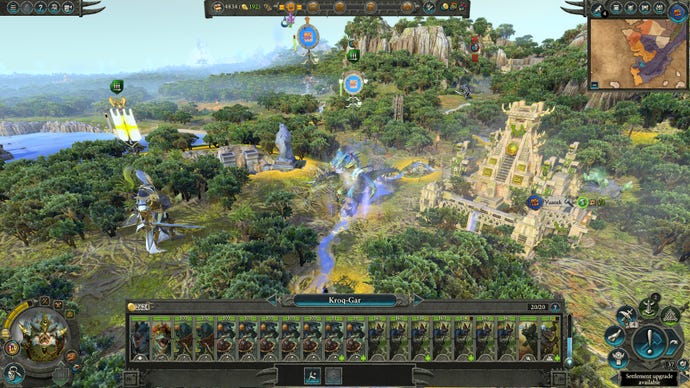
For all the praise heaped on Total War: Shogun 2 and Three Kingdoms, there's one thing they seriously lack. Monsters. Total War: Warhammer II, however, solves the series' Vitamin M deficiency with aplomb. Technically, this game is more like an absolutely titanic piece of DLC for the original Total War: Warhammer than an actual sequel. While it has its own set of factions and its own campaign map, its true glory is arguably in its Mortal Empires campaign, which mashes together the maps and faction sets for both games for a beautifully bloated experience. It would be worth the asking price for that alone.
We contemplated replacing T'Warhammer II with the newer T'Warhammer III in this 2022 re-ranking, but as much as we love Creative Assembly's latest monster epic, it's still the middle sibling of this now trilogy that holds fast in our hearts - if nothing else, it has years and years' worth of expansions and free updates to delve into on top of the main campaign. Given the massive differences between factions (skeletons, vampire pirates, Aztec lizards and cannibal goatmen are just the tip of the iceberg), the game arguably offers much greater replayability than any others in the series, too.
10. Age Of Empires II: Definitive Edition
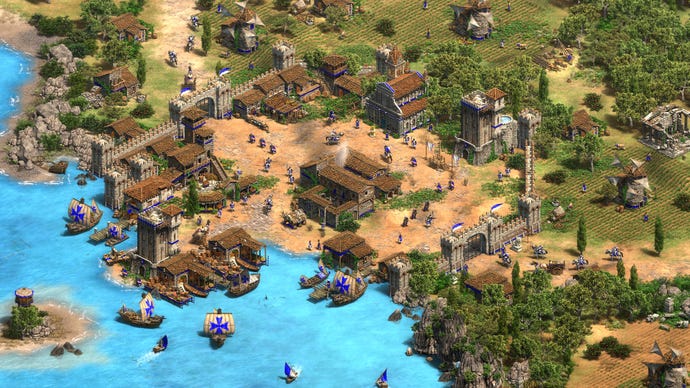
AoE2 was the high water mark of the 2D, isometric-ish, gather-and-mangle format. It was superbly balanced, perfectly paced, and offered just the right mix of economic and military play. Definitive Edition, however, is more than just AoE2's glammed-up zombie. It's a giant sexy Frankenstein, with the contents of five separate expansions (four of which were originally made by extremely talented fans), and a whole castle full of brand new content, sewn onto the body of the original game (and no, you're wrong: Frankenstein was the monster's name. The scientist was called Microsoft). Oh, and they made it look utterly beautiful too, and added dozens of little UI and control improvements to circumvent annoyances such as having to manually reseed farms.
With 35 civilisations to play as, 136 single-player missions over 24 campaigns, more multiplayer maps than we can be arsed to count, and even a built-in training mode to get people up to speed for multiplayer, it's more than double the size of the original game, and hundreds of hours' worth of fun even before you start fighting other people. If there had never been an AoE2, and this had been released out of nowhere in 2019, it would have blown people's minds. Long live the (age of) king(s).
9. Invisible, Inc.
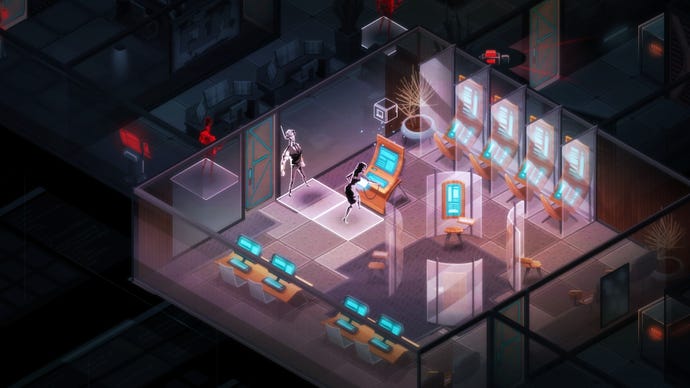
A few years ago, claiming that Mark of the Ninja was anything other than Klei's masterpiece would have been considered rude at best. That the studio have created an even more inventive, intelligent and enjoyable game already seems preposterous, but Invisible, Inc. is exactly that. And, splendidly, Invisible, Inc. is one of the greatest tactical games ever made, its focus on just a few controllable units making for scenes of incredible tension. It's the kind of game where you throw your hands in the air at the start of a turn, convinced that all is lost, and map out a perfect plan ten minutes later.
The reinvention of the familiar sneaking and stealing genre as a game of turn-based tactics deserves a medal for outstanding bravery, and Invisible, Inc. might well be the best wholly original turn-based game released in a decade. Everything from the brief campaign structure to the heavily customizable play styles has been designed to encourage experimentation as well as creating the aforementioned tension. This is a game which believes that information is power, and the screen will tell you everything you need to know to survive. The genius of Invisible, Inc. is that it creates such drama and tension within its infinite procedural environments, which adjust themselves according to your personal desires.
8. Sid Meier's Alpha Centauri
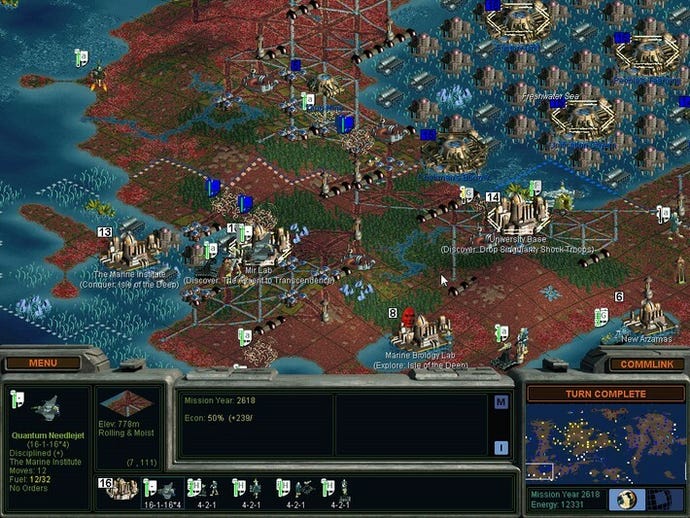
After Earth, the stars. The release of the disappointing Civilization: Beyond Earth has only served to improved Alpha Centauri's stock. Charting the colonization of a new planet, Alpha Centauri is not only one of the greatest 4X strategy games in existence, it's also one of the greatest sci-fi games. No game before or since has managed to construct such a strong authored narrative that takes place between and behind the turn-by-turn systems at play. It is a complete thing, and several grades above the usual space opera hokum.
It could have been a re-skin - Civilization III in all but name - but Alpha Centauri radically rethinks the basic building blocks of 4X gaming, beginning with the planet itself. Discarding the idea of terrain types, Firaxis created a procedural system that mapped contours and climate to create believable hills and valleys, along with the water that flows across them. As the game continues, seems that the process of colonising is a reversal of Civilization, in which fertile plains become industrial scars. You are creating a paradise rather than working one into destruction, or so it seems. Of course, that's not the whole story. There was already life on this 'new' planet, after all, and there's still life in Alpha Centauri and will be for decades to come.
7. Stellaris
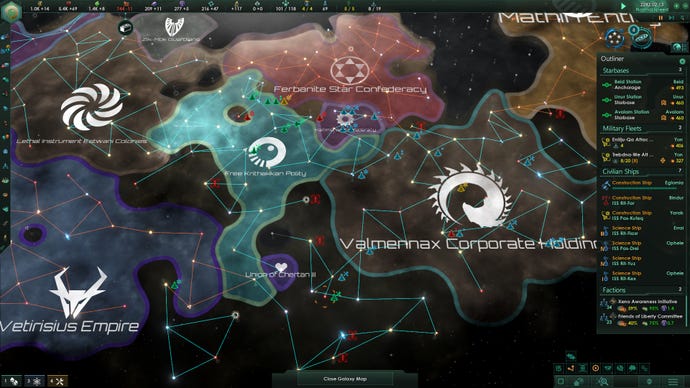
Paradox's first foray into galactic-scale 4X had a bit of a rocky start in life, but a slew of big updates and even bigger DLC expansions has seen Stellaris continue to evolve into something far more impressive, and most importantly more varied, than it once was.
Paradox often sticks with its games for the long-haul, as we've also seen with the likes of Crusader Kings II and Cities: Skylines, but so far it's Stellaris that has benefited most from this approach. Whole systems have been ripped out and replaced in the name of slicker and smarter galactic empire-building. Its tussle of space civilizations is now vast and strange, all gene wars and synth rebellions alongside the more expected likes of imperialistic aliens, and it's a whole lot better set up for pacifistic play than it once was too. This empire has very much struck back.
6. Sid Meier's Civilization VI
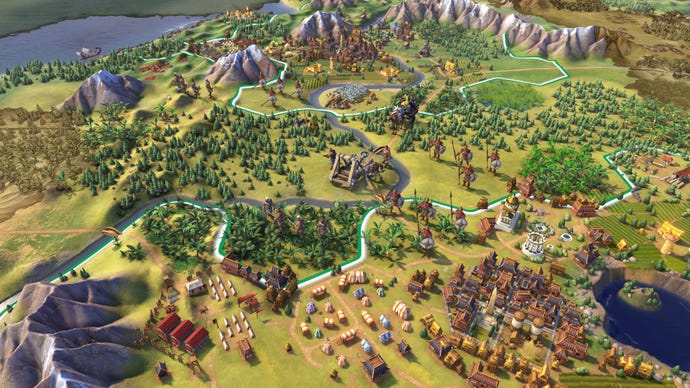
It's easy to dismiss the value of incremental improvements. We're drawn to the flashy and the new, to innovations that light the touchpaper of change. Civilisation VI isn't a huge leap forward for the series, but a step or two still make it the best one yet. The old draw is still there. You get to take a nation from conception to robot-aided world domination. Win the space race, infect the world with (your) culture. Pressgang the UN. Get nuked by Gandhi. It's a marriage of scope and personality that surpasses most game's attempts at either.
Civ VI funnels that grand strategy through smaller milestones. You might reach a new continent to boost research speed for a key technology, or focus on winning round a city-state with a few well placed envoys. City-planning matters more, thanks to specialised districts with adjacency bonuses. It's pleasingly grounding - a way of chipping away at that layer of abstraction while adding another welcome layer of strategy. It refines ideas the series has been playing around with for decades. No one change is revolutionary, and nor is their cumulative impact. They still make it the best Civ by far, and Civ games are fantastic.
5. Desperados III
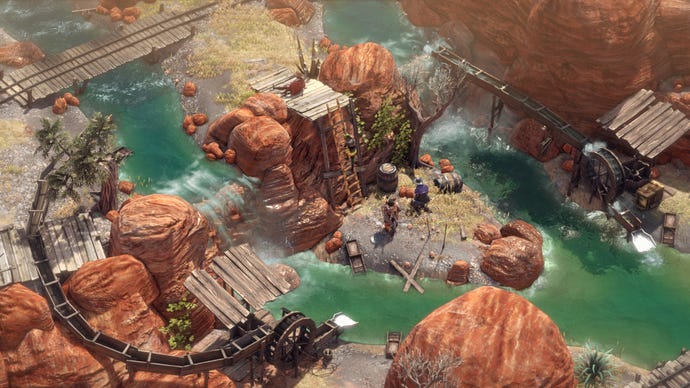
Picking between Desperados III and Shadow Tactics took an afternoon of beard stroking; but if Mimimi's real-time stealth tactics adventures have taught us anything, it's the value of carefully considered actions. Reinvigorating a sub-genre left dormant since the glory days of Commandos and Desperados, the German studio remind us of the pleasures of shuffling tiny murderers through dioramas, under the watchful - not to mention very green, and triangular - eyes of nervous bandits. Add an elegant, communicative interface and smart, interlocking character abilities and it's the best the genre has been.
A couple of vital tweaks see the cowboy-flavoured variation win out over the 2017 ninja adventure: for starters, the ability to fully freeze the action and program in multiple character moves for grand coordinated takedowns. While a key feature of Shadow Tactics, time continued there, making this the more surgical application. Secondly, the introduction of social stealth, a la Hitman, adding more variety as you encourage bandits to have 'accidents' around rodeo bulls and plot an audacious kidnapping from a grand party. Achieve it without mind control darts and we salute you. Yep: Desperados III is rootin' tootin' grade-A snoopin'.
4. Crusader Kings 3
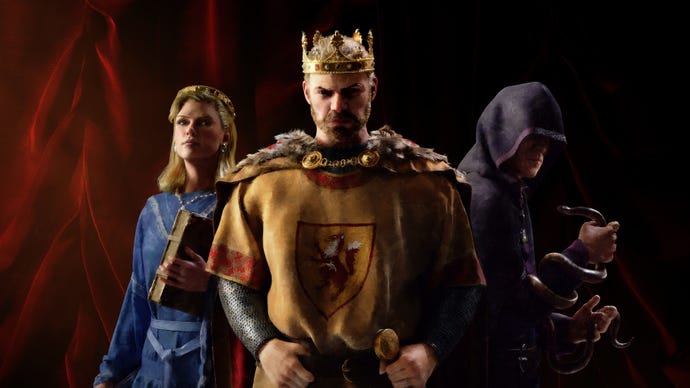
The Crusader Kings games are strategy/RPG hybrids. While you'll spend time commanding troops and conquering territory, you'll also fret about the day to day life of the ruler you're controlling. You'll worry about the rival ambitions of your vassals, wonder whether your scornful wife is mad about the dirty dishes or outright plotting to kill you, and dread the charmless idiot your daughter just married. The stakes of these family dramas are every bit as important as your southern front, because when your ruler does eventually collapse in the throne room, you'll assume control of their heir, and have to live on with all the consequences of your previous actions.
It's a grand strategy game whose systems create real stories, because they're about people rather than about flanking manoeuvres. What's more, its refined interface makes it a much more enjoyable game to play than its predecessor. If you've not played a Crusader Kings game before then CK3 is where you should start. It's by no means a simple game, but the tutorial, tooltips and new layout will help you enormously. If you have played a Crusader Kings game before, then you probably don't need us to tell you what's great about the series or which game you should play. If you're a seasoned Crusader Kings 2 player with a dozen expansions installed, then yes, you may be better served by remaining with the older game for a year or two more. But when the time does come for you to move on, Crusader Kings 3 is a worthy heir.
3. FTL: Faster Than Light
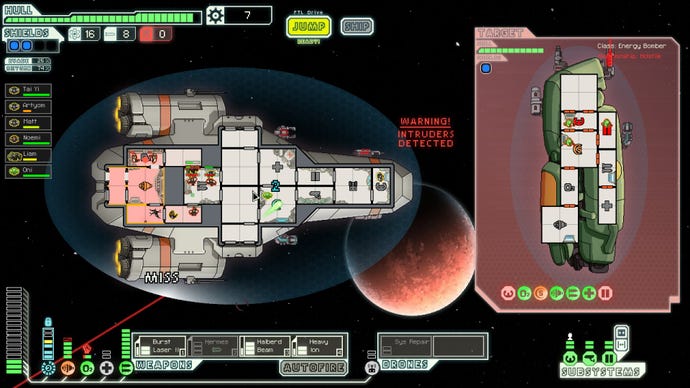
Umpteen games offer the fantasy of being a roguish spaceship pilot, but a childhood spent watching Star Trek might leave you with different life goals. A fantasy in which there are enemies on the view screen, fires in the engine room, and your survival is reliant on a mysterious alien passenger you picked up at the last planet you visited. FTL revels in creating science fiction scenarios like this.
It's a roguelike in which you control small spaceships and their crew from a top-down perspective. You're flying at lightspeed across the galaxy to evade an approaching deadly force, and must make decisions about where to visit, how long to linger in each sector, and what items to trade. You'll be attacked by slavers in an area where solar flares periodically damage your ship. You're hoping you can rescue one of those slaves and gain a new crew member, but there's also the very real risk you'll get blown up and lose all your progress. Two minutes later, the slavers are destroyed, but your engines were damaged in the fight. You've vented the oxygen from the engine room to snuff out the flames, but you can't fly away until they're repaired and the next solar flare hits in another 60 seconds. Now decide: which of your crew are you going to sacrifice by sending them into the vacuum to repair the engines? FTL generates these dramatic moments with ease, while being easy to pick up, running on anything, and with variety enough to keep you entertained for years. A true masterpiece.
2. XCOM 2
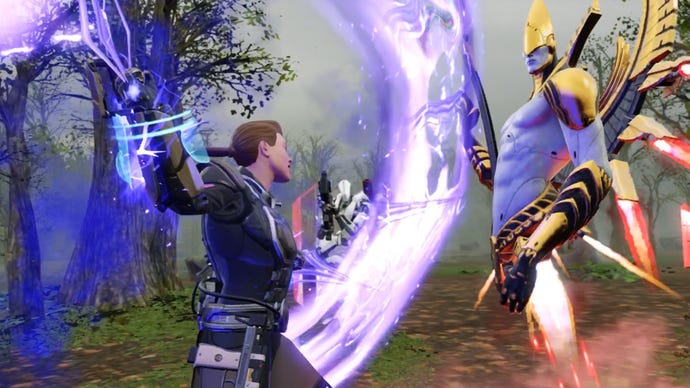
XCOM 2, together with its equally excellent expansion War Of The Chosen, is one of the finest strategy games of all time - and it's made all the more remarkable by how different it becomes when step up to that aforementioned expansion. War Of The Chosen is the superheroic cheese to XCOM 2's guerilla tactics chalk. Where XCOM takes a country walk away from the expansive tactical complexity of the original 90s X-COM, War Of The Chosen sprints full-pelt into another continent.
Your best soldiers will not be merely skilled in the use of weapons - they will become The Avengers, capable of the most absurd feats of sci-fi heroism. Better still, the base/strategy layer breaks the choke-hold of both XCOM and XCOM 2's single golden path of upgrades, allowing multiple different ways of staving off a slow death by resource drain. It is, admittedly, very, very silly, and attempts to maintain about nine different tones at once. That harlequin nature is at least part of the charm.
1. Into The Breach
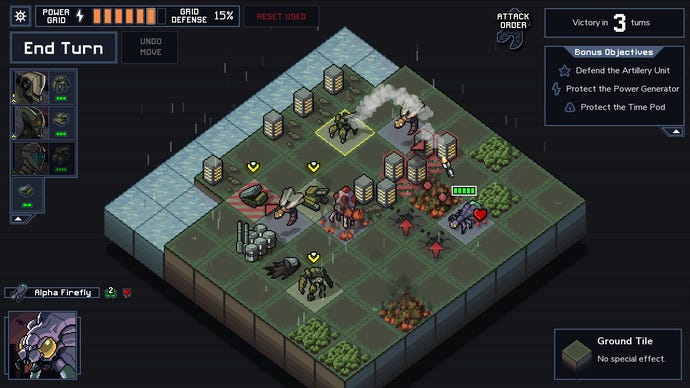
In a perfect world, something will come along and handily leapfrog this turn-based mechs vs giganto-beasts follow-up to FTL, but in terms of what strategy game we would go out and tell almost anyone to go out and play right now? There is no other answer - especially with the recent addition of its free Advanced Edition update. Into The Breach throws out every millilitre of superfluous strategy bathwater without losing even a single bit of baby in the process. It asks you to focus only on the most immediate problem to hand: your guys are there, the acid-spitting enemy is there, a skyscraper full of helpless civilians is there: what are you gonna do, hotshot?
Every. Single. Action counts in Into The Breach. Failing to do something useful with one of your three units almost always spells doom. The adjective to beat for Into The Breach is 'elegant', but maybe that makes it sound cold and distant. Only the opposite is true: it rings high drama out of every movement, and it does so while having the confidence to leave your imagination to fill in the gaps left by its 2D, minimally-animated presentation. To show anything else would take time, and taking time would only make it baggy, and it is precisely because Into The Breach is not baggy in the slightest that it feels like such a (currently) final word on how to make a turn-based strategy game.
An instant-classic masterpiece that doesn't even remotely try to tell us it's a masterpiece. It just gets on with the job.
Off the list
Alas, as with every re-ranking, there are inevitable some games we end up saying goodbye to. There's only a been a small shift this time round, but we've swapped in Marvel's Midnight Suns and said goodbye to Men Of War. Previous entries that we've retired from the list also include Sacrifice and Dawn Of Man.
This doesn't mean that we don't still love these games, or that they won't be featured here again in the future, but right now they just fall short of that top 50 cut-off.
